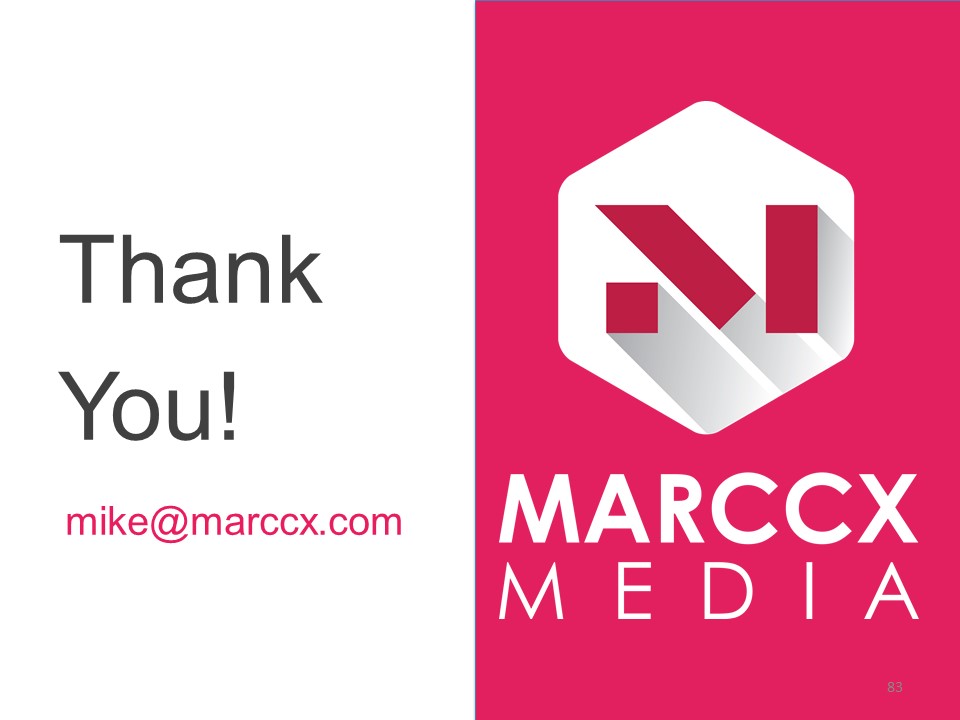This is the presentation deck presented at the New York E-Commerce Meetup on September 13, 2017:
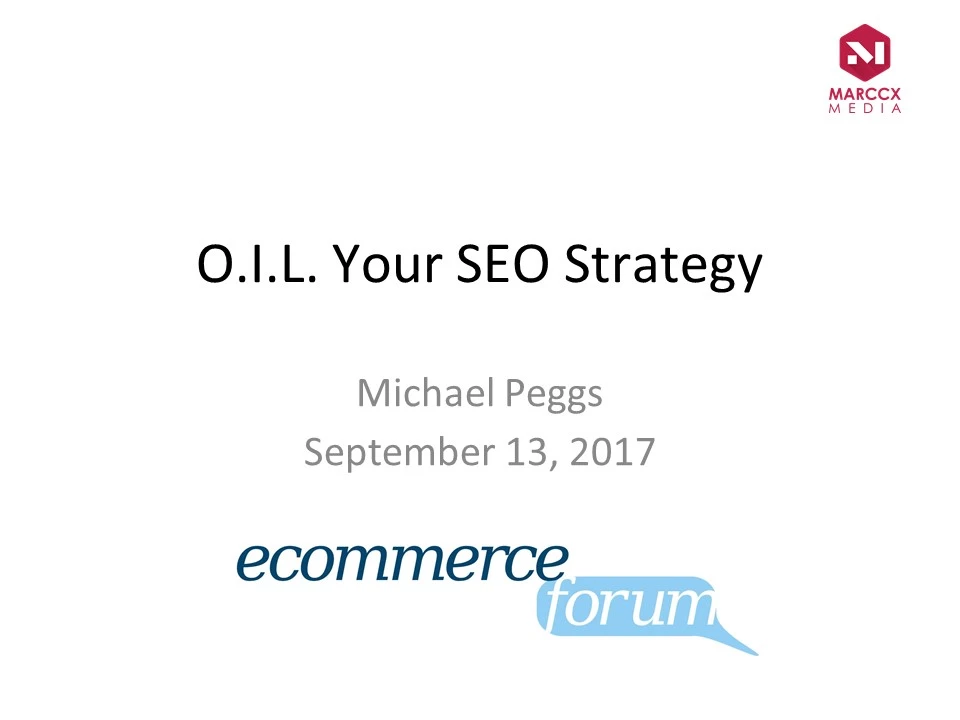
O.I.L. Your SEO Strategy
Michale Peggs
September 13, 2017
Agenda
- Why SEO?
- What is SEO?
- Onsite Optimization
- Influencer Outreach
- Link Building
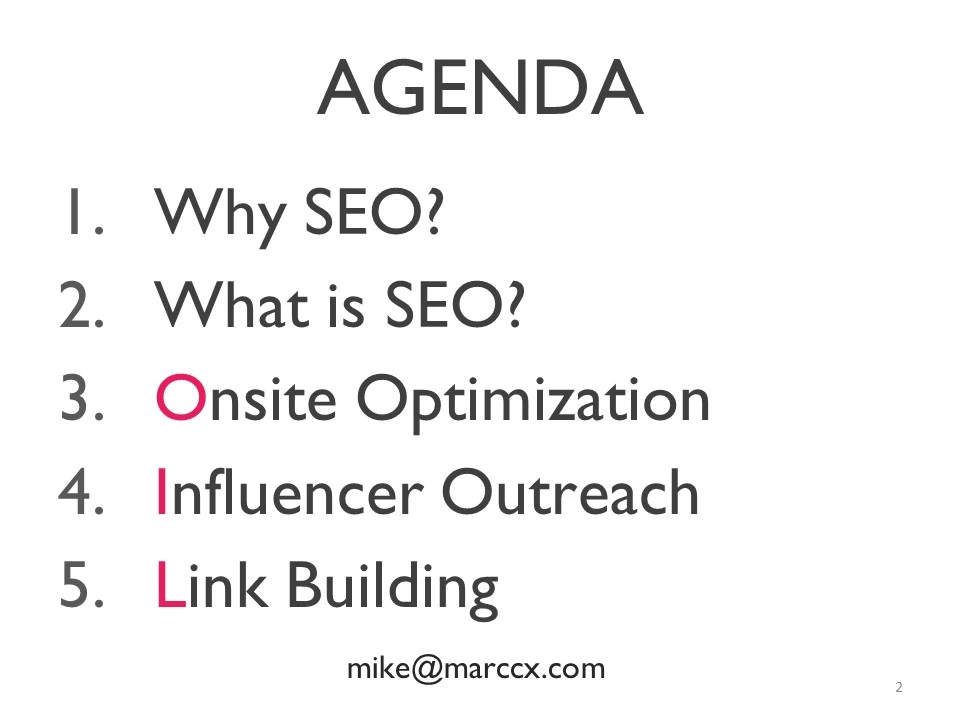
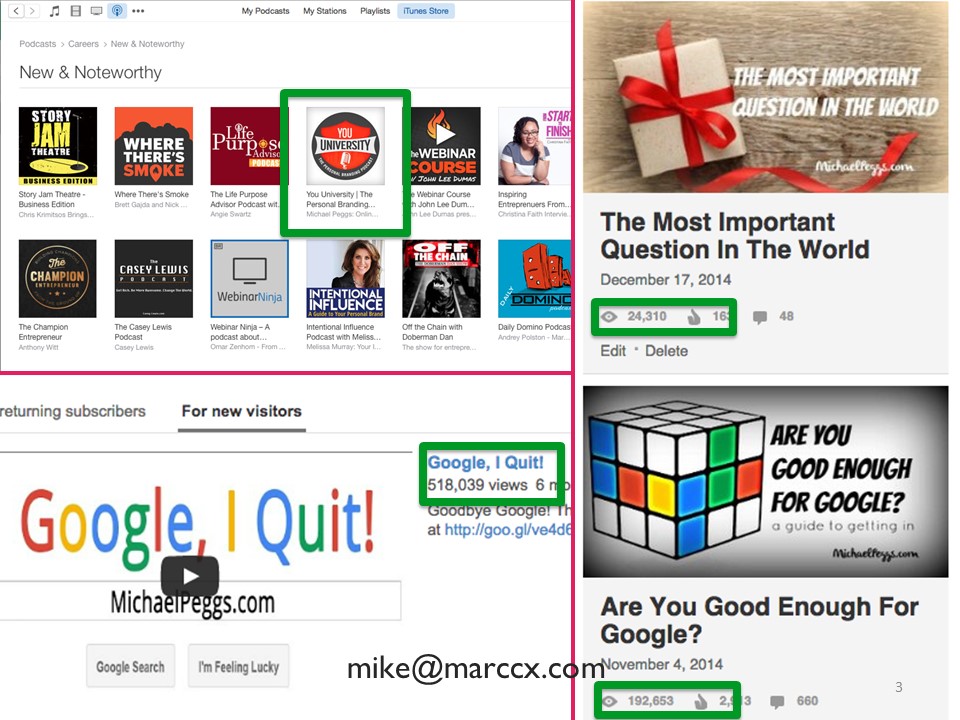
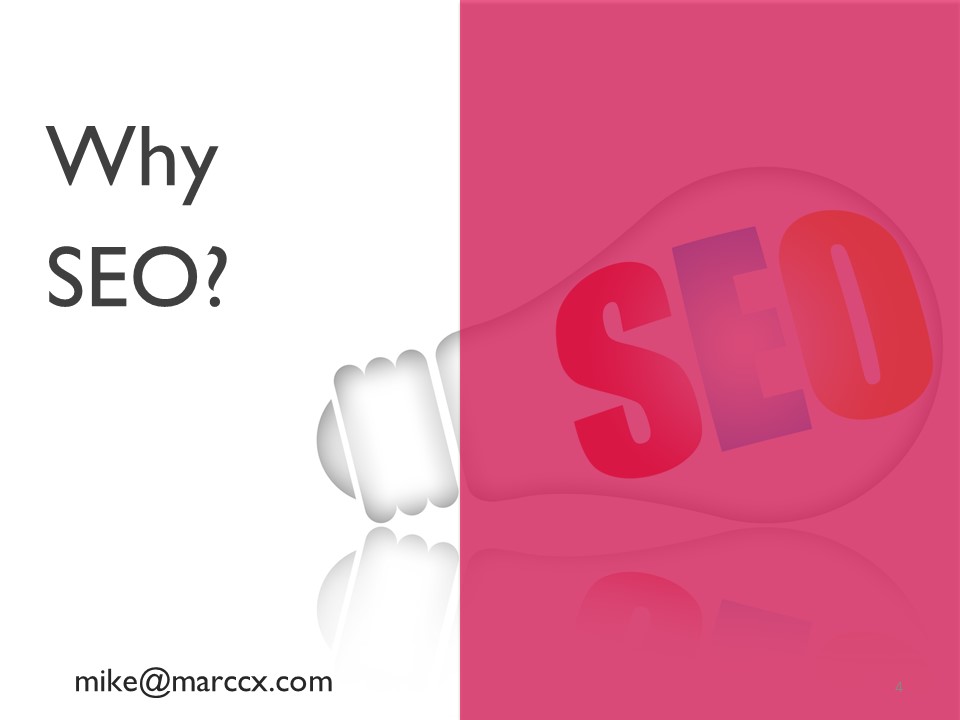
SEO vs. SEM (PPC/CPC)
Why SEO?
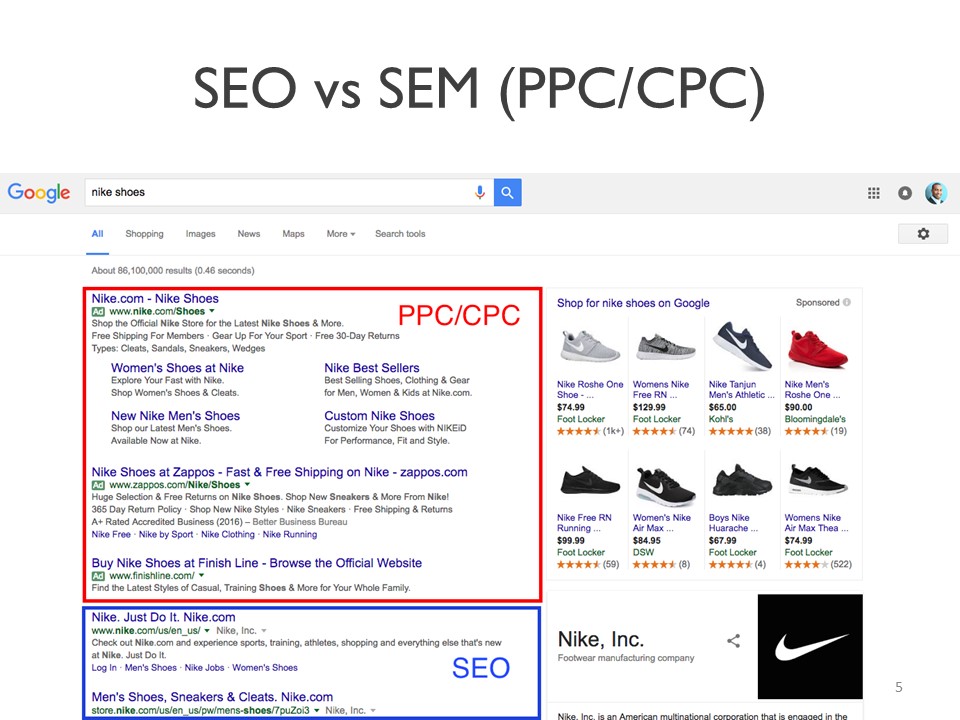
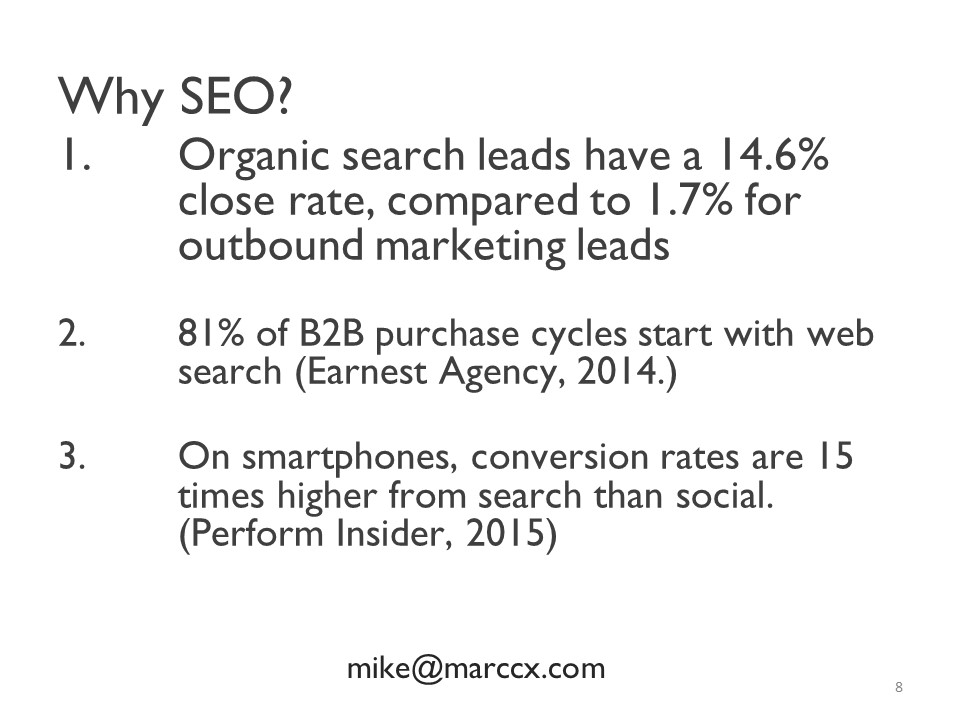
Why SEO?
- Organic search leads have a 14.6% close rate, compared to 1.7% for outbound marketing leads
- 81% of B2B purchase cycles start with web search (Eanest Agency, 2014)
- On smartphones, conversion rates are 15 times higher from search than social. (Perform Insider, 2015)
SEO leads have a 14.6% close rate, while outbound leads (such as cold calls, direct mail, online advertising or print advertising) have a 1.7% close rate
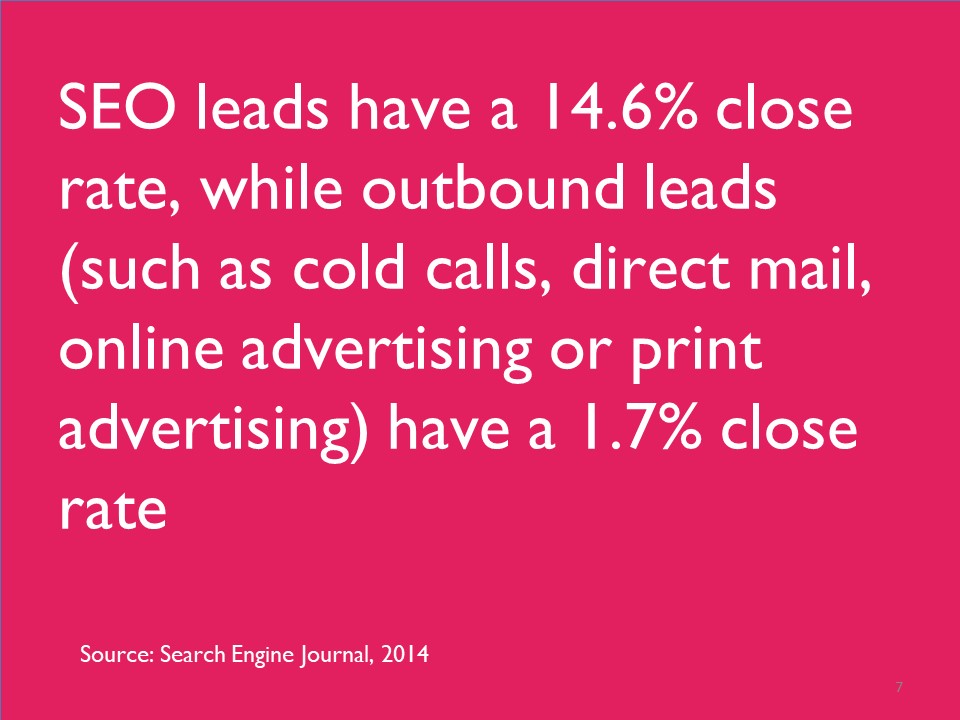
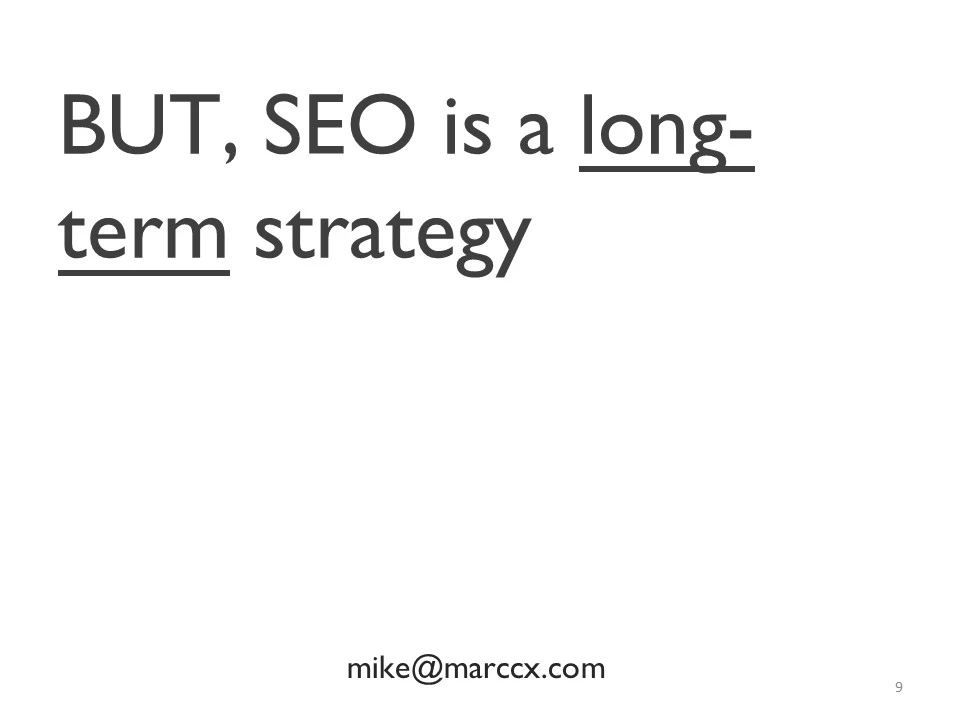
BUT, SEO is a long-term strategy
What is SEO?
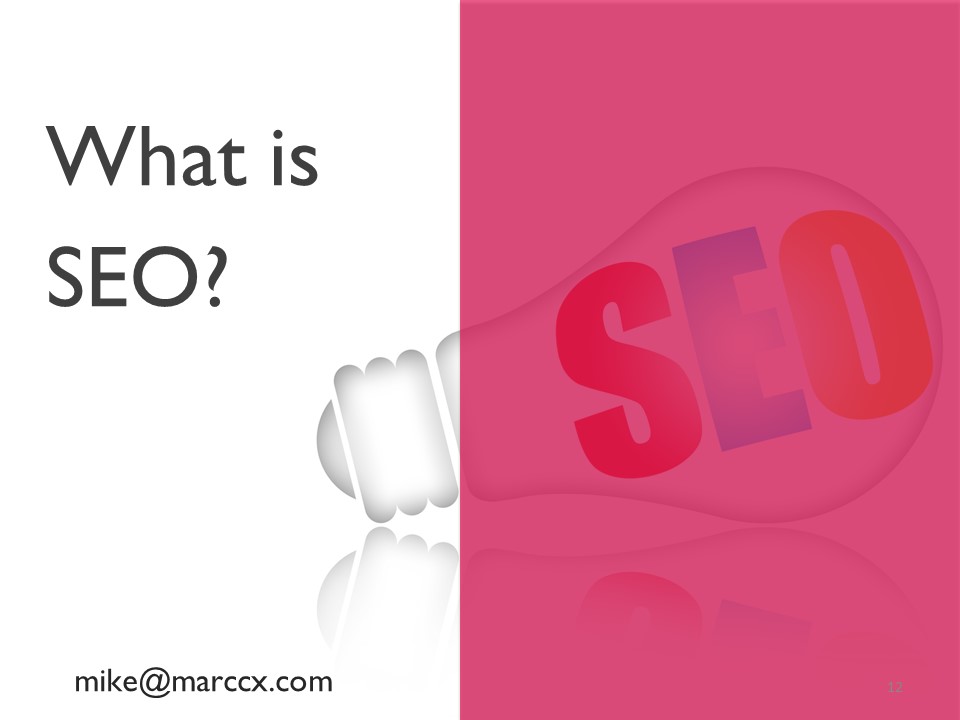
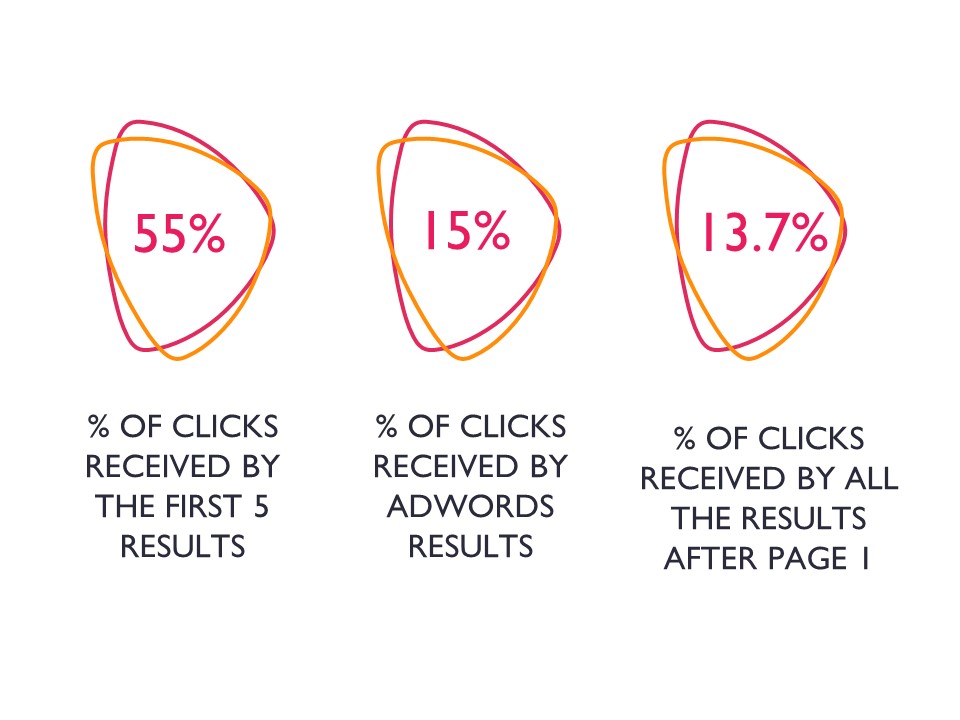
55% of clicks received by the first 5 results
15% of clicks received by adwords results
13.7% of clicks received by all the results after page 1
… and why should you care?
TRAFFIC
(sales & other stuff)
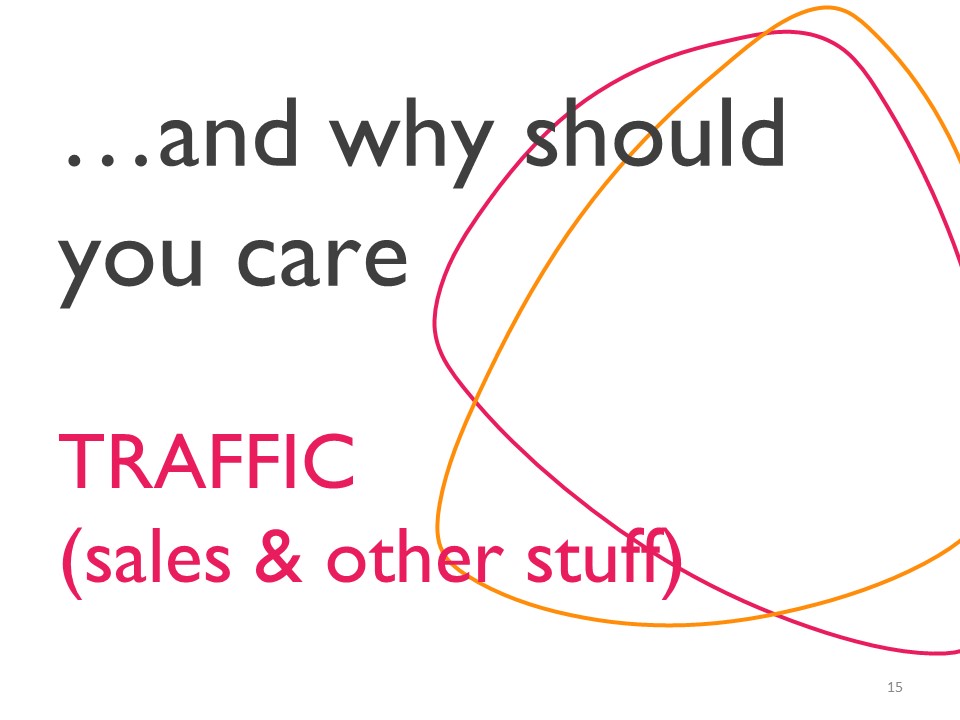
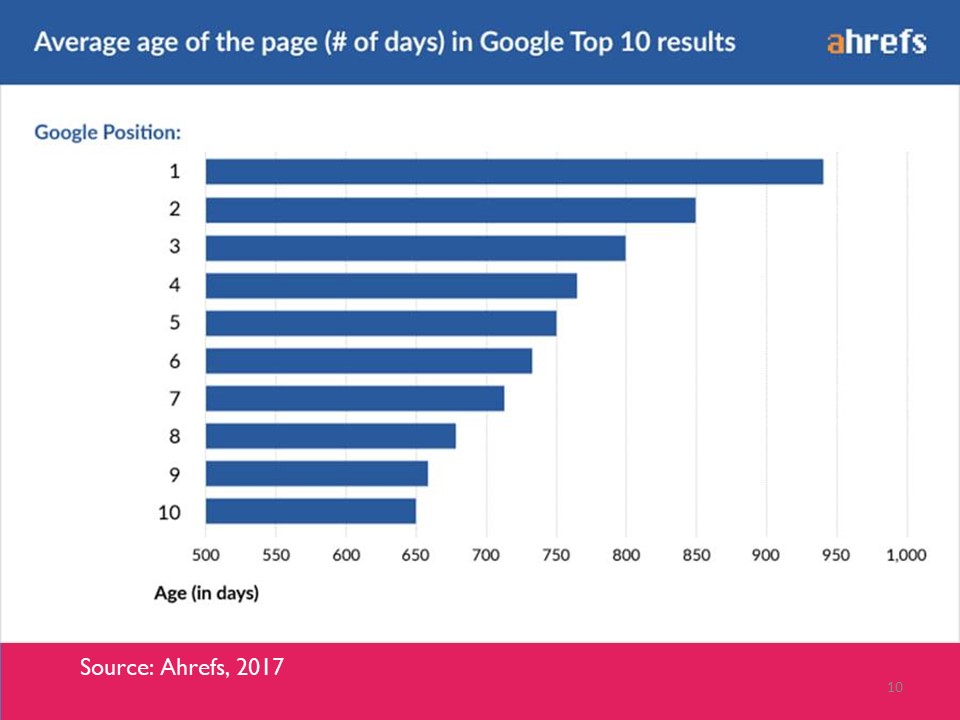
Average age of the page (# of days) in Google Top 10 results
The aveage Top 10 ranking page is 2+ years old. And those that rank at position #1 are almost 3 years old (on average).
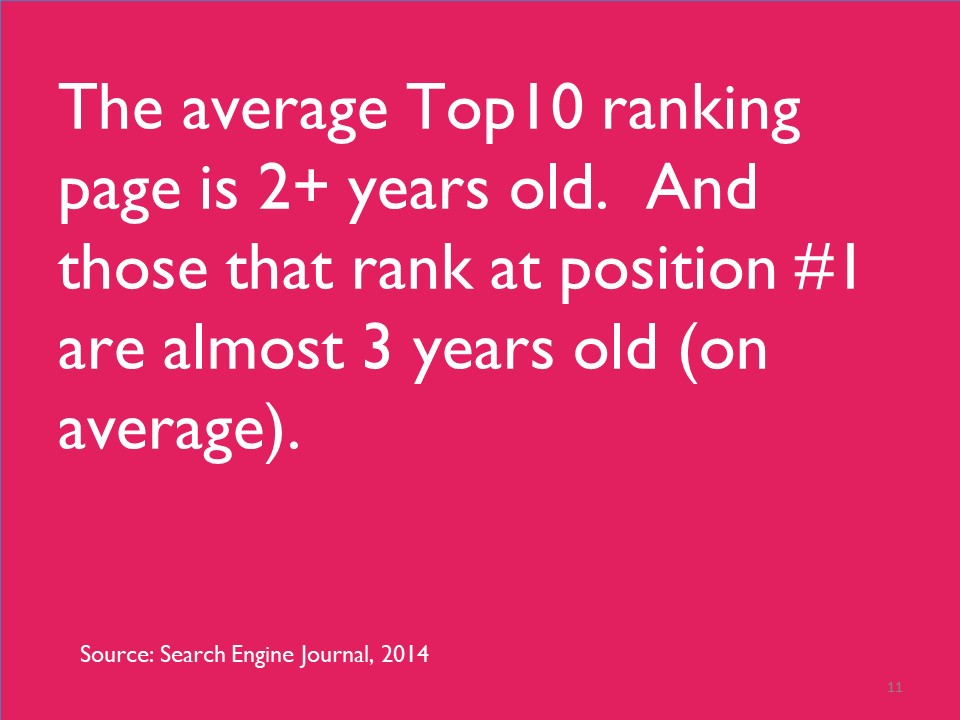
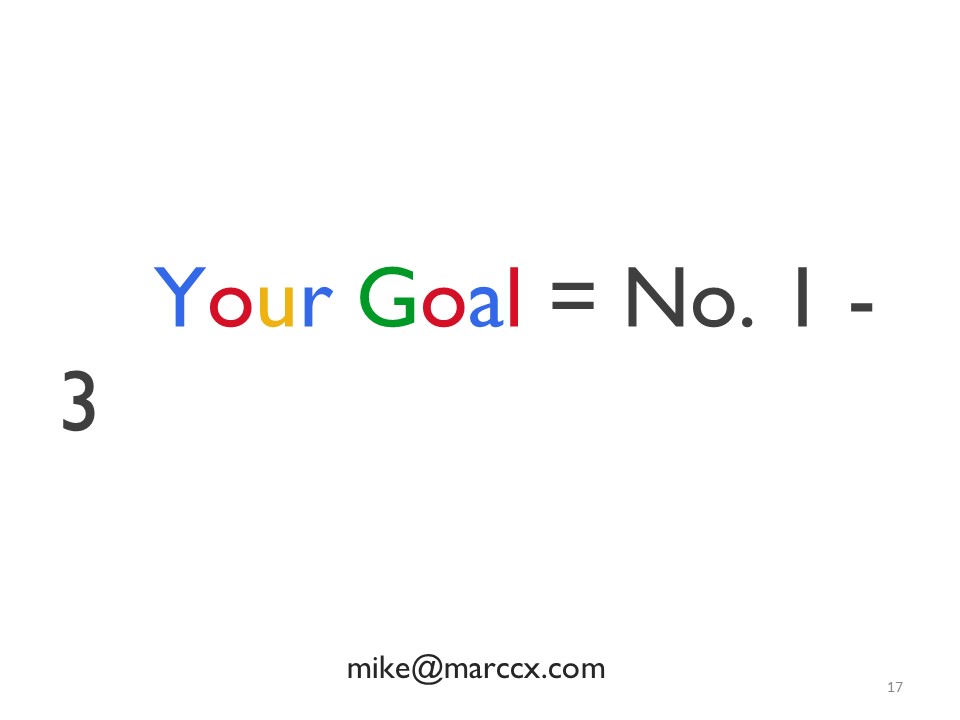
Your Goal = No. 1-3 rank on Google
250+ Ranking Factors
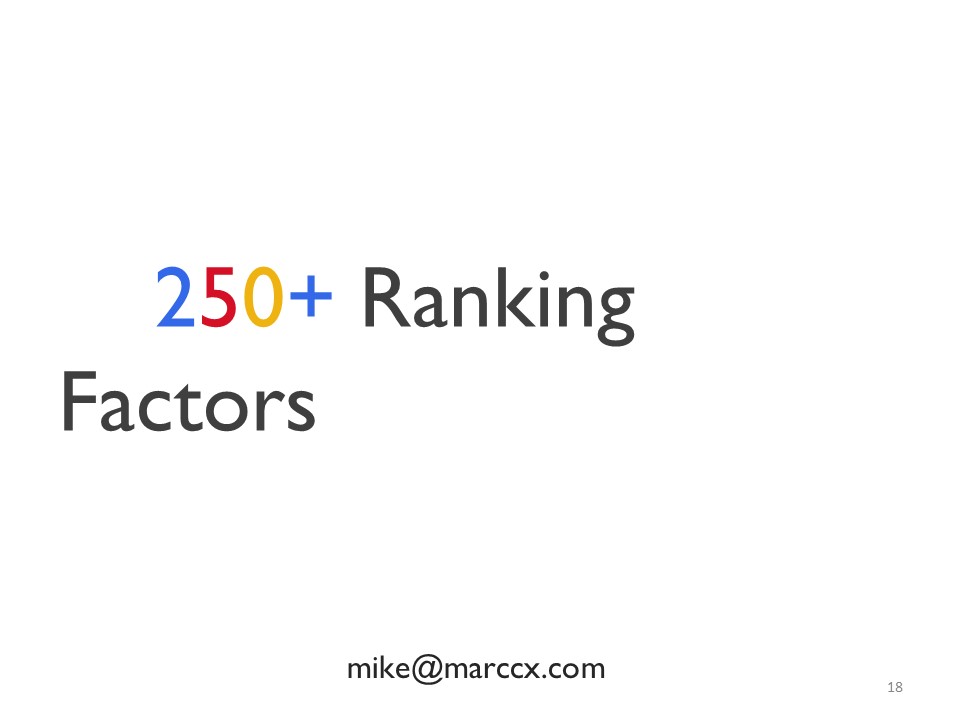
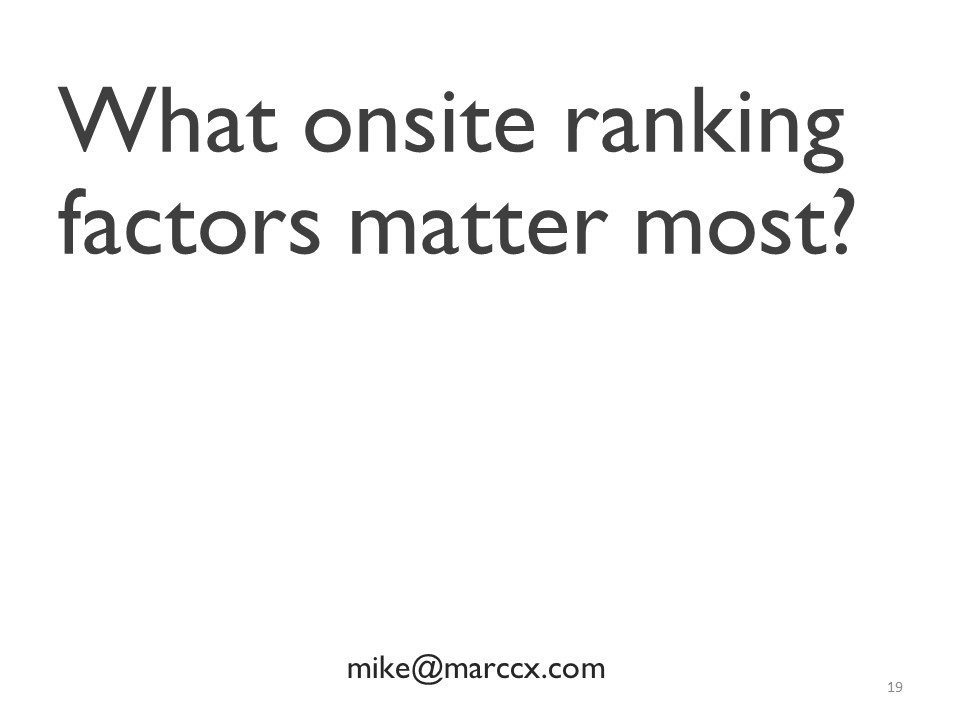
What onsite ranking factors matter most?
O.I.L. Strategy
- Onsite Optimization (on-page elements)
- Influencer outreach (off-page elements)
- Link Building (off-page elements)
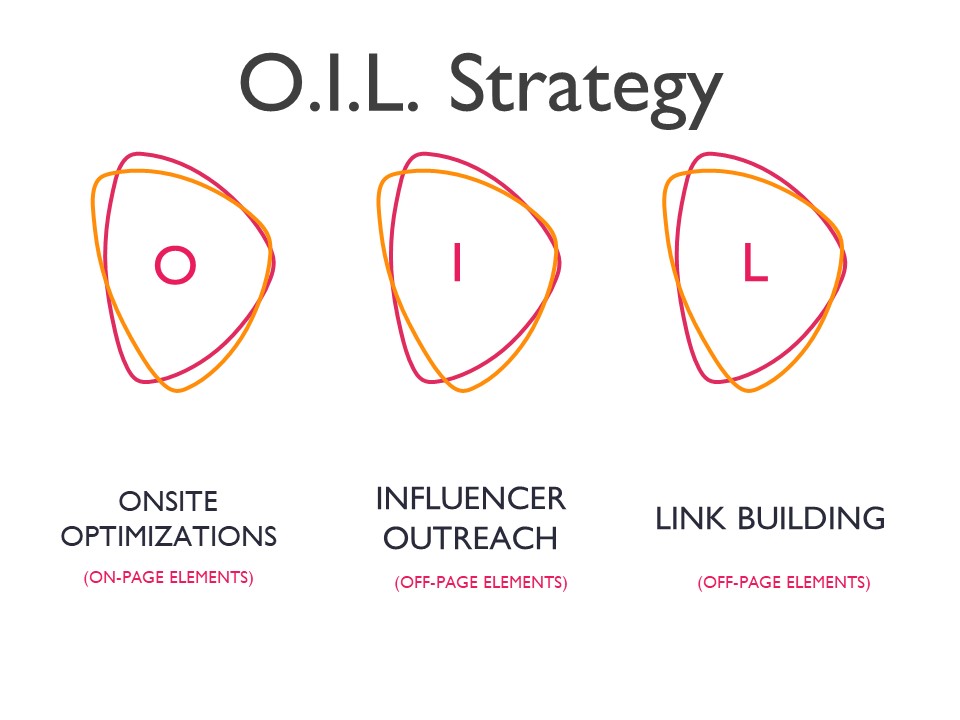
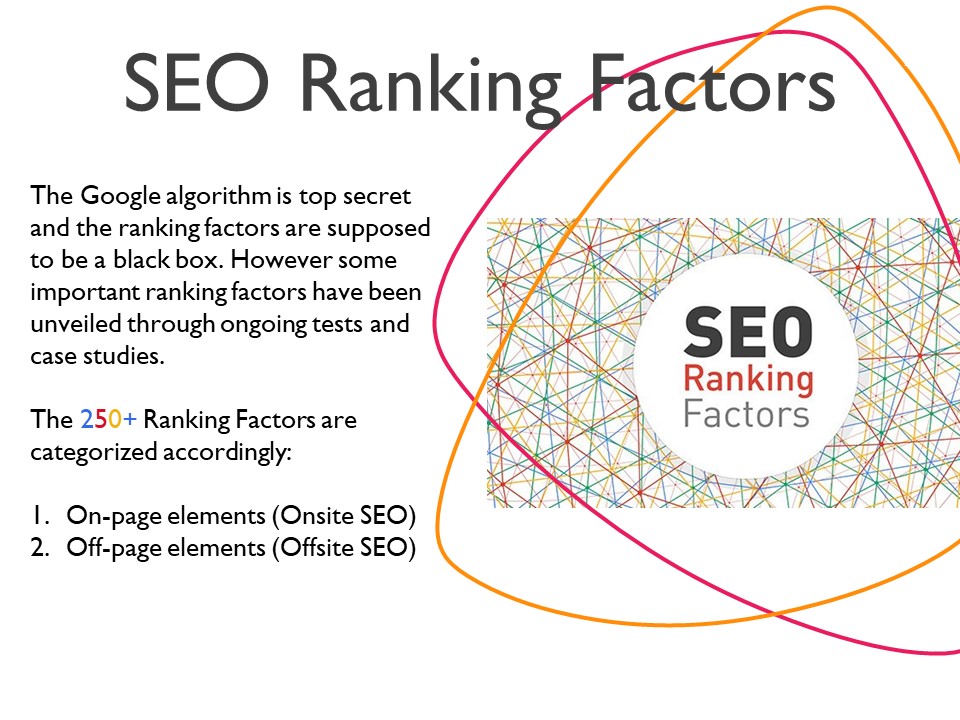
SEO Ranking Factors
The Google algorithm is top secret and the ranking factors are supposed to be a black box. However some important ranking factors have been unveiled through ongoing tests and case studies.
The 250+ Ranking Factors are categorized accordingly:
- On-page elements (Onsite SEO)
- Off-page elements (Offsite SEO)
Onsite Optimization (O.I.L. Strategy)
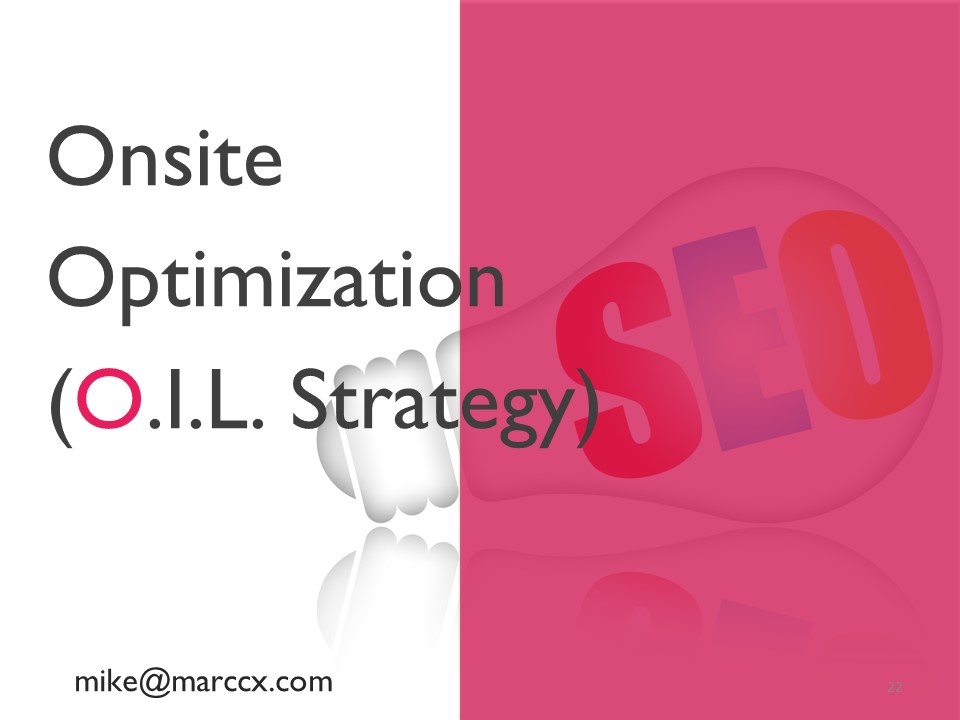
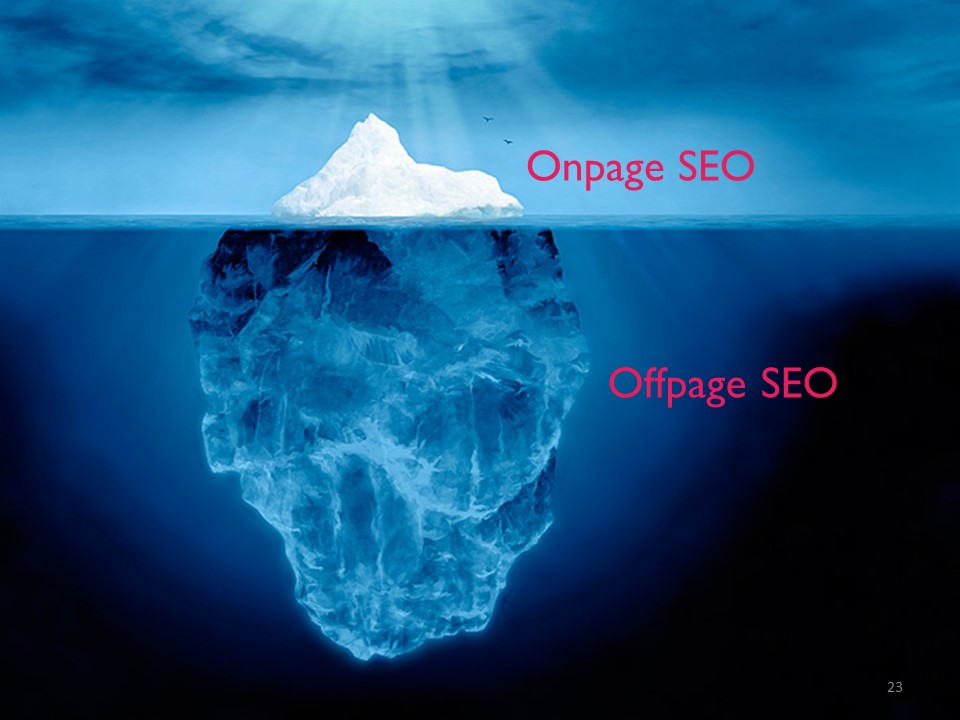
Picture Onpage SEO vs. Offpage SEO as the tip of the iceberg and the body hidden in the water.
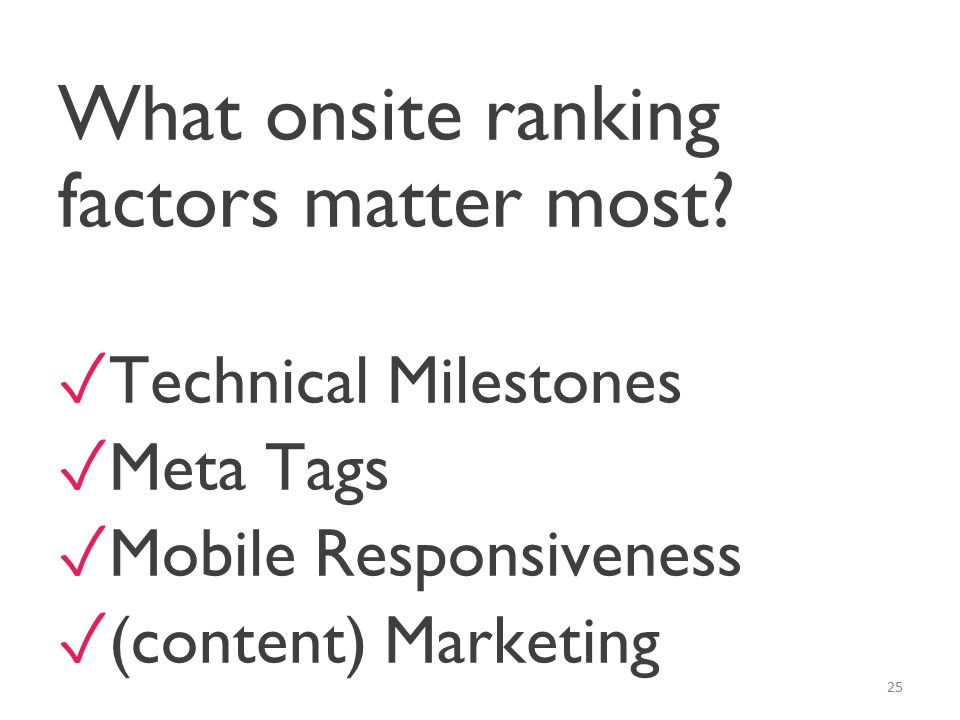
What onsite ranking factor matter most?
- Technical Milestones
- Meta Tags
- Mobile Responsiveness
- (content) Marketing
Meta Tags are snippets of text that describe a page’s content
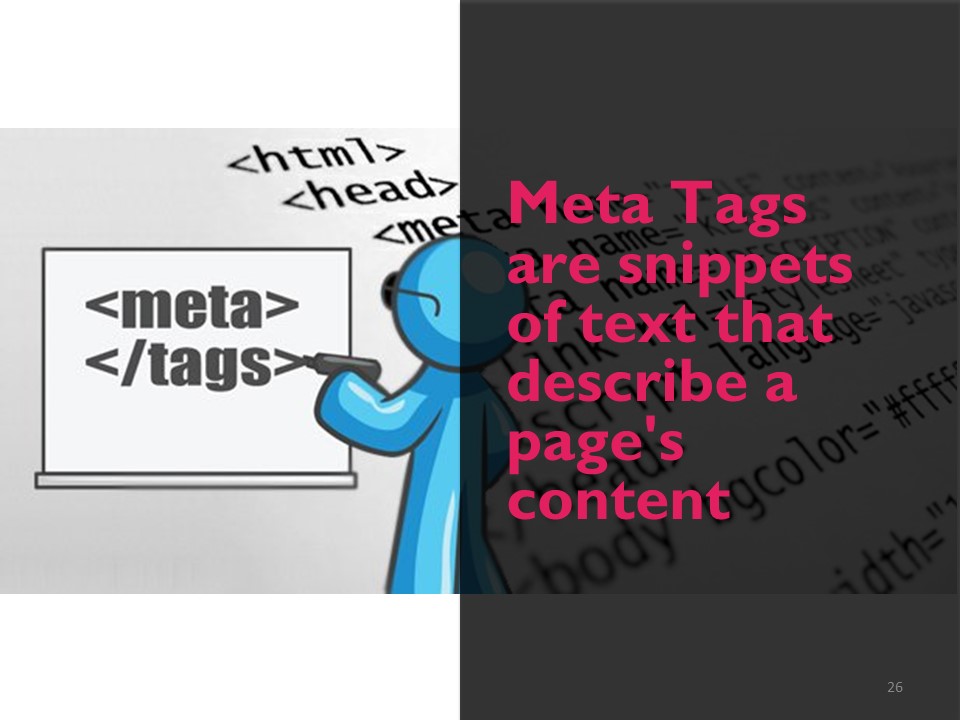
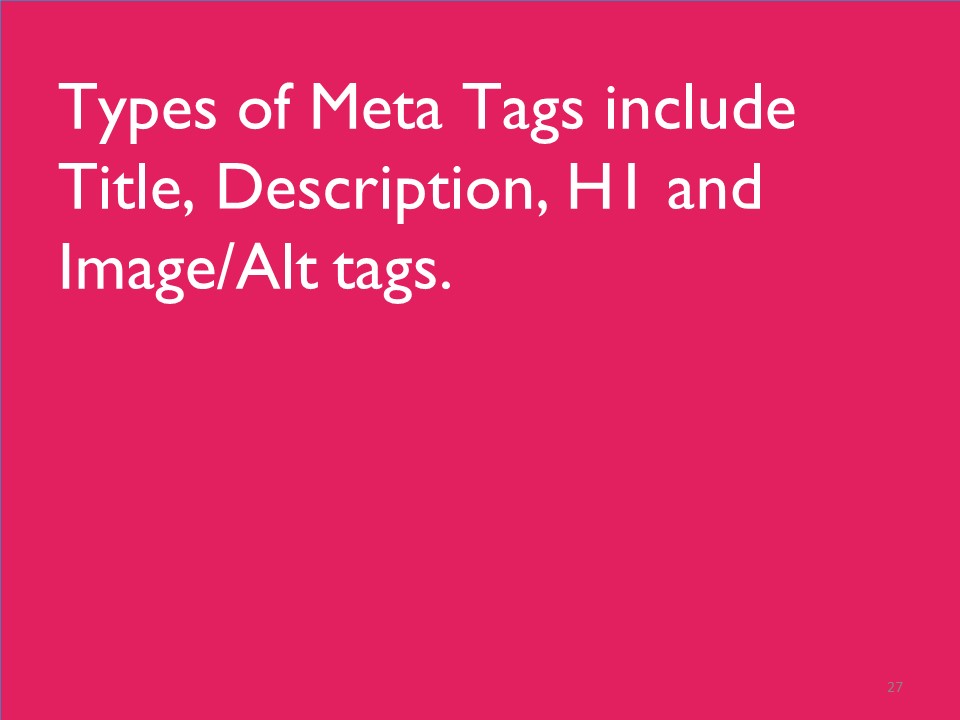
Types of Meta Tags include Title, Description, H1 and Image/Alt tags.
Let’s say our target keyword is “best shoe insoles for work”
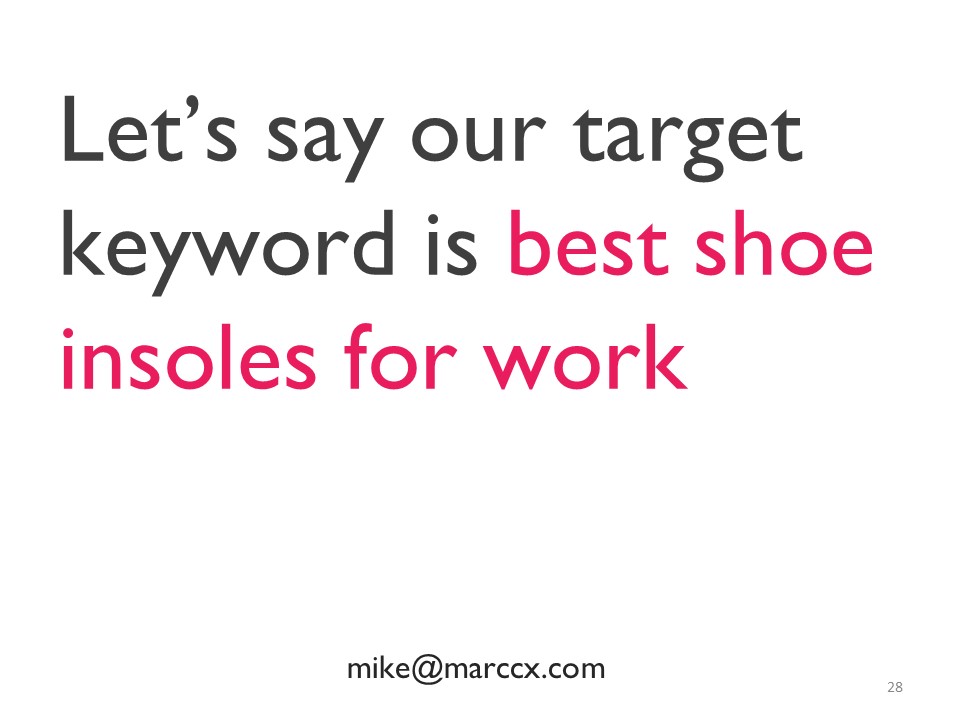
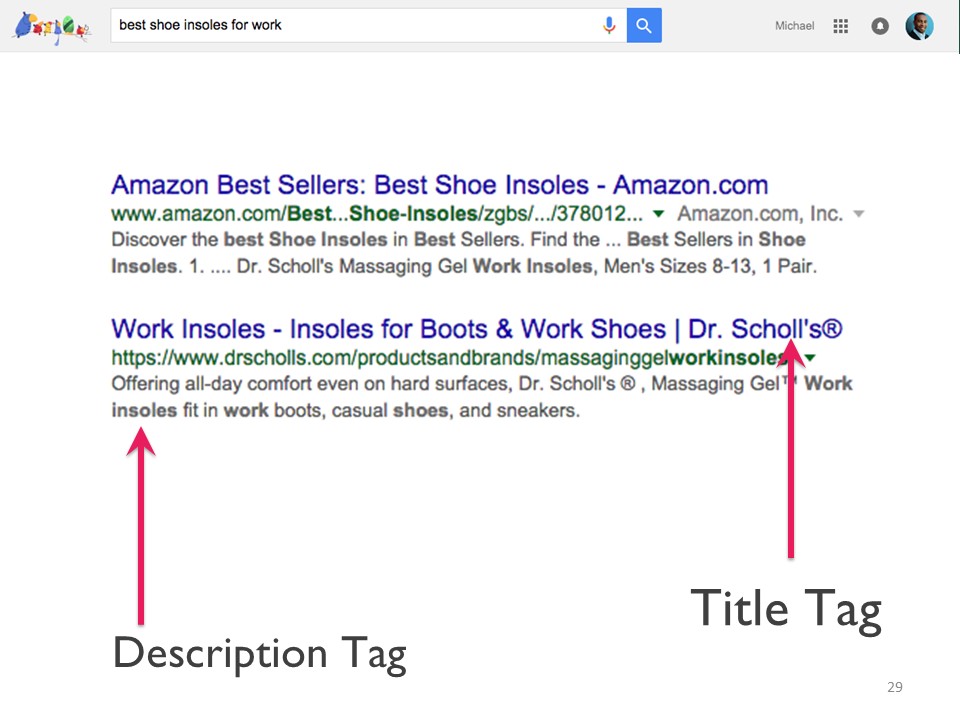
- Description Tag
- Title Tag
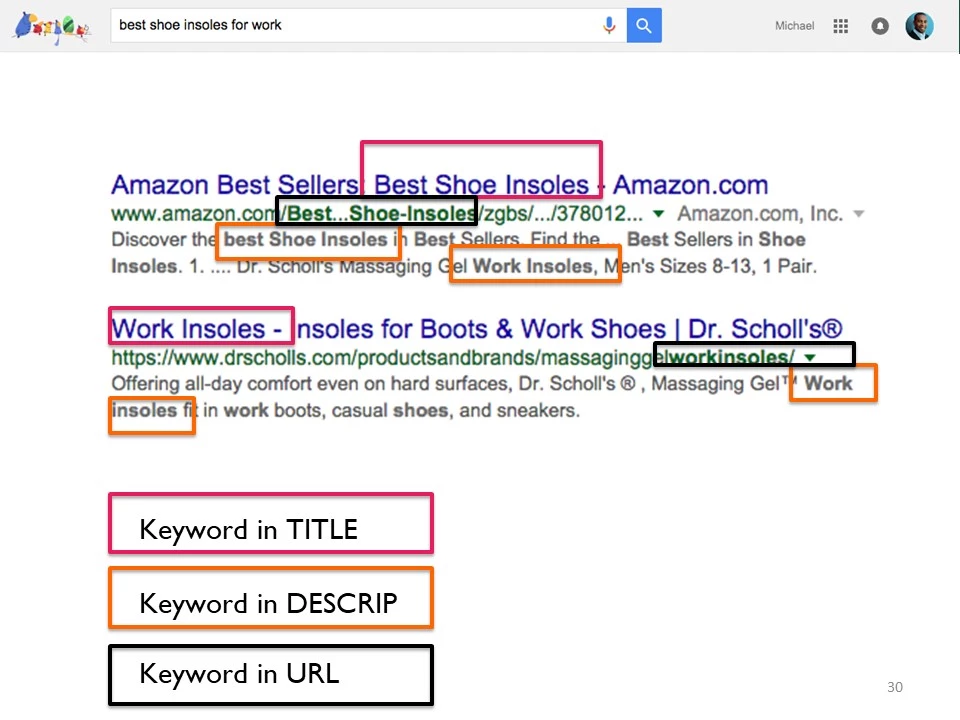
- Keyword in Title
- Keyword in Description
- Keyword in URL
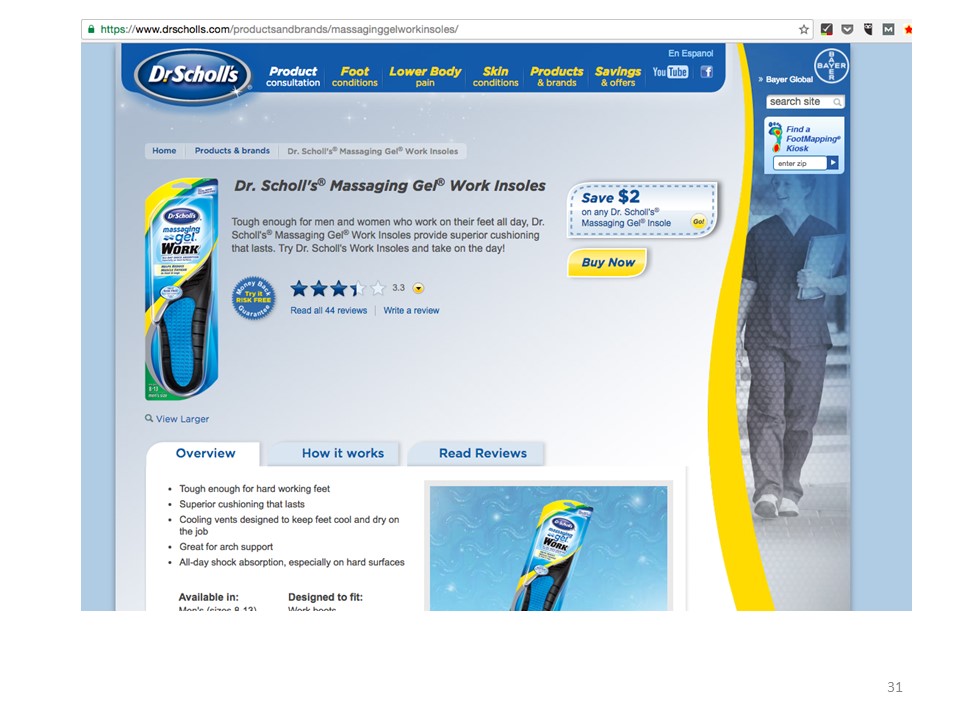
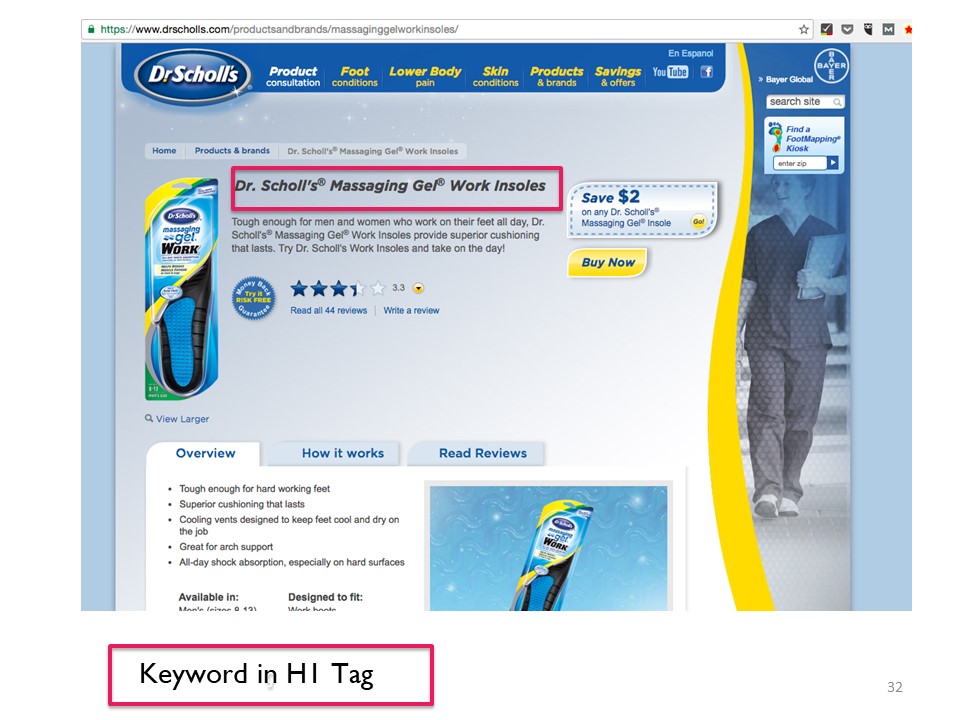
Keywrod in H1 Tag
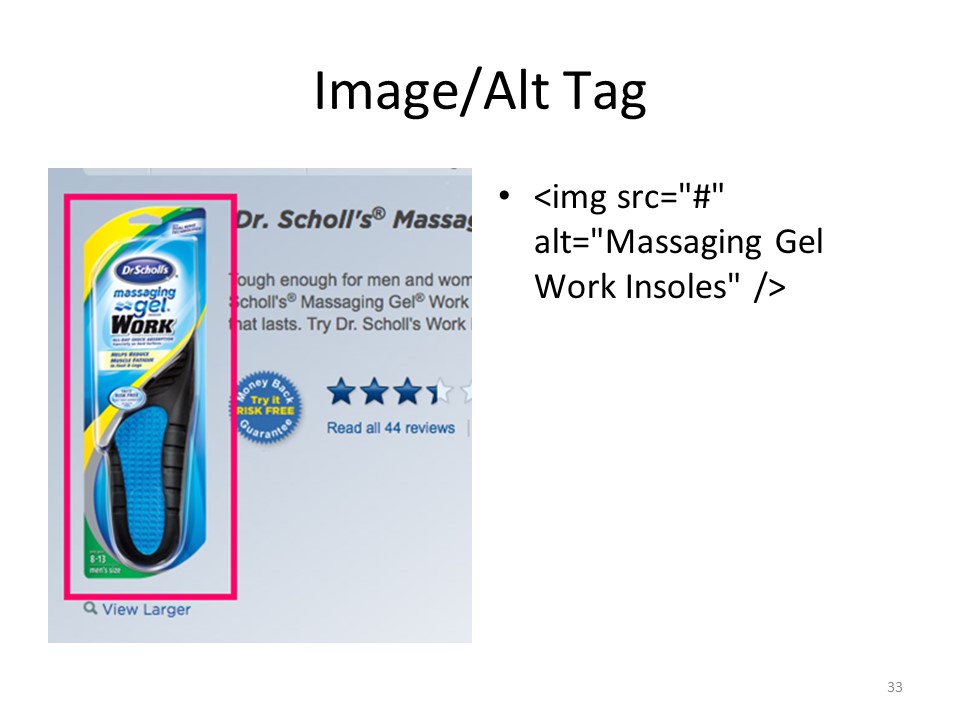
Image/Alt Tag
<img src=”#” alt=”massaging gel work insoles” />
Onsite SEO Best Practices
- Focus on 1 Primary Keyword and no than 2-3 secondary keywords per page
- Use the Primary Keyword at least once, preferably at the start of the Title Tag
- Limit the Title Tag to 70 characters or less (longer titles than this will get cut off in the SERP)
- Use the primary keyword at least once, preferably in the first half of the Description Tag, and limit to 2-3 target keywords overall
- Limit to 155 characters or less (again, descriptions longer than this will get cut off in the SERP)
- If you can customize your URL, use one dash between words and include your focus keyword
- Link internally to specific sections of your site
- Link externally to credible websites that offer additional value to your user
- Optimize the image file name & alt tag with one primary keyword
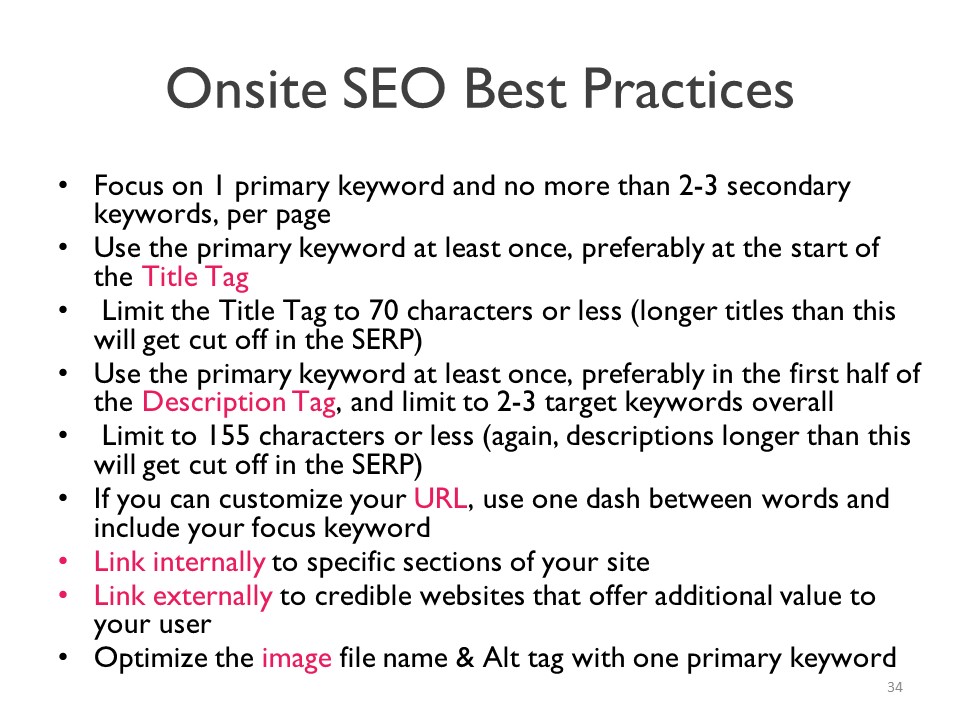
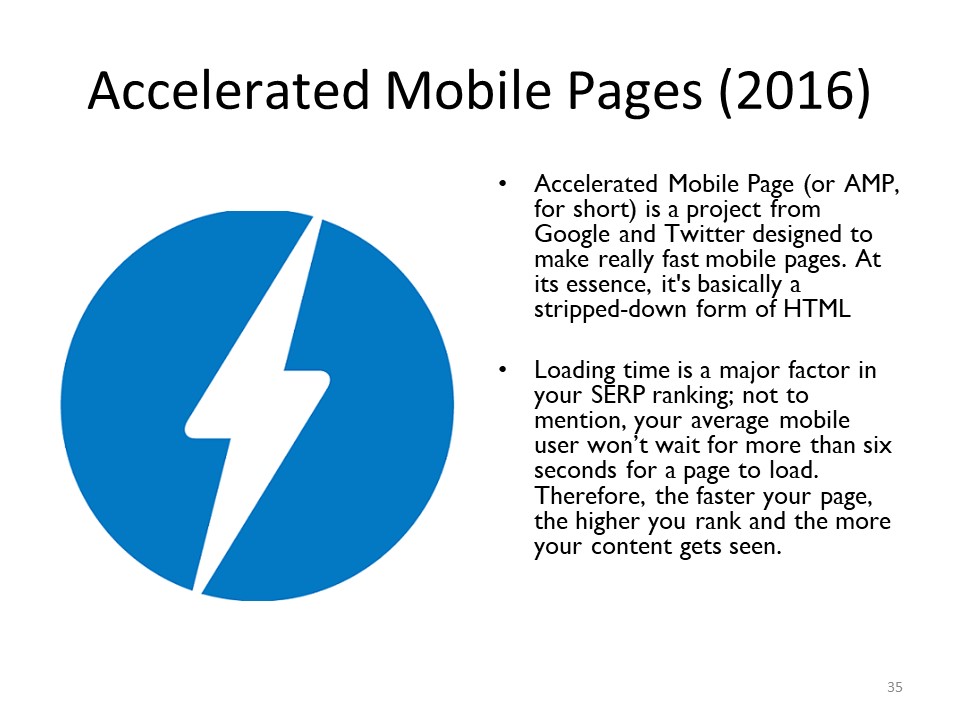
Accelerated Mobile Pages (AMP) (2016)
- Accelerated Mobile Page (or AMP, for short) is a project from Google and Twitter designed to make really fast mobile pages. At its essence, it’s basically a stripped-down form of HTML
- Loading time is a major factor in your SERP ranking; not to mention, your average mobile user won’t wait fro more than six seconds for a page to load. Therefore, the faster your page, the higher you rank and the more your content gets seen.
A word on Content Marketing
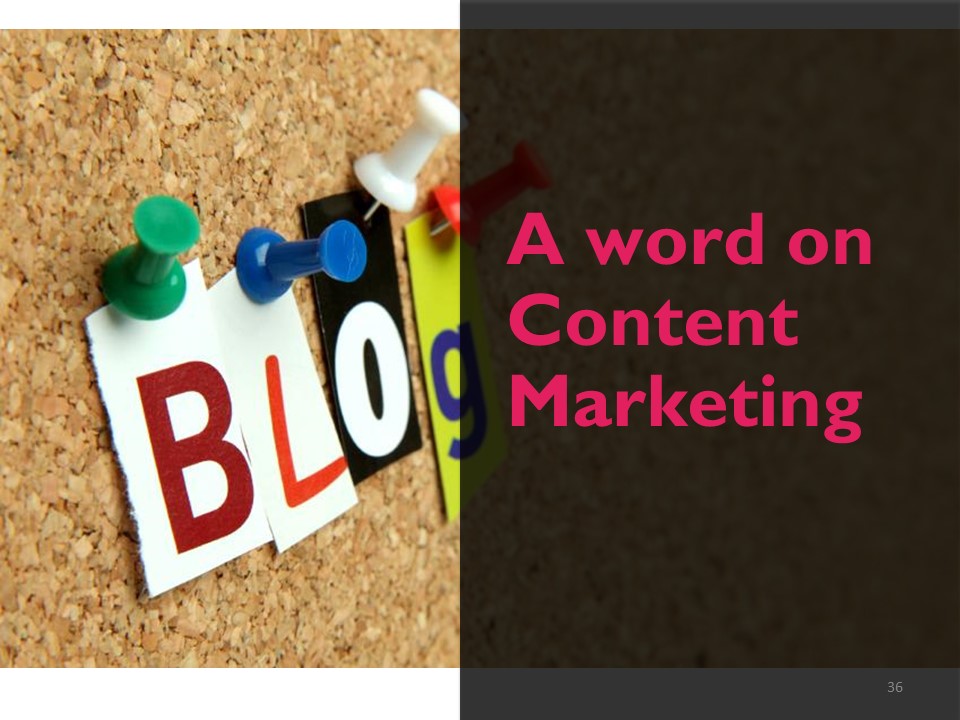
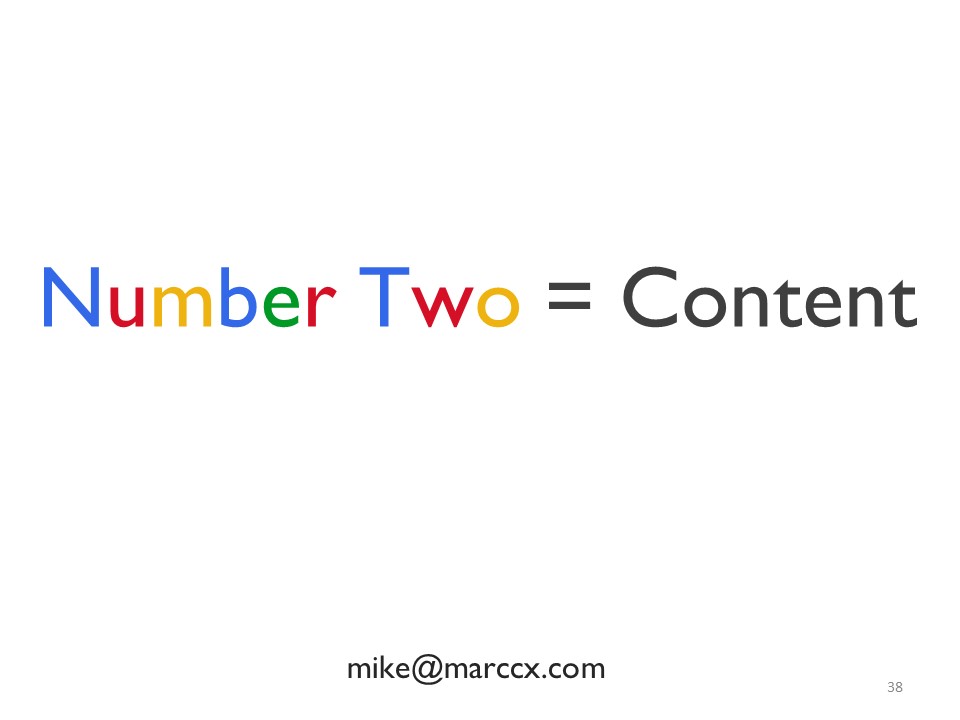
Number Two = Content
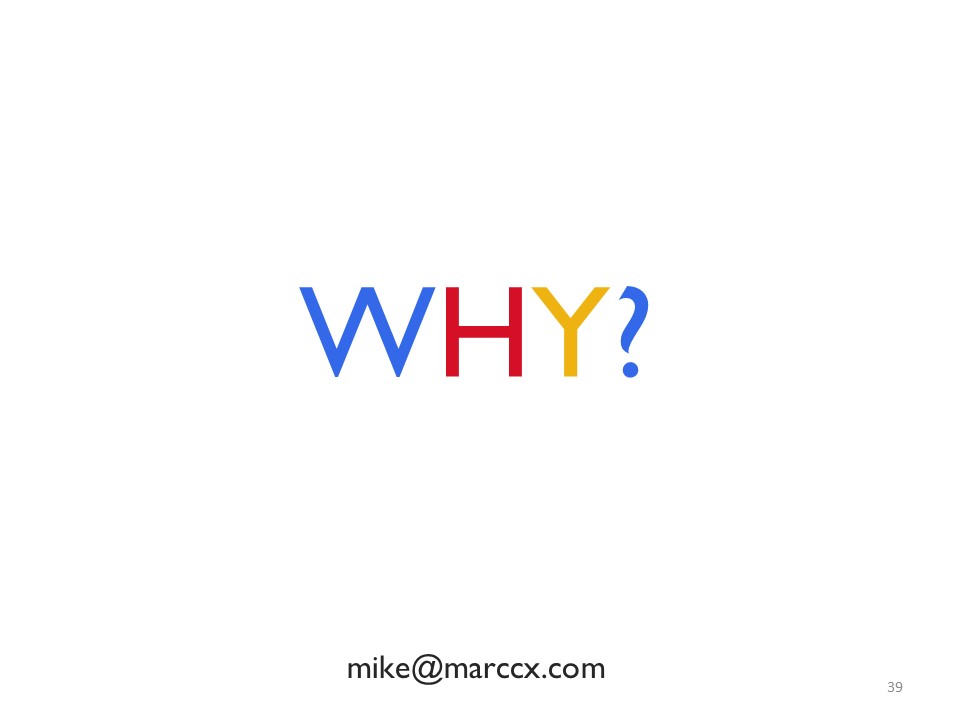
Why?
99% of B2B buyers are influenced by content
88% of US consumers research online, prior to purchase
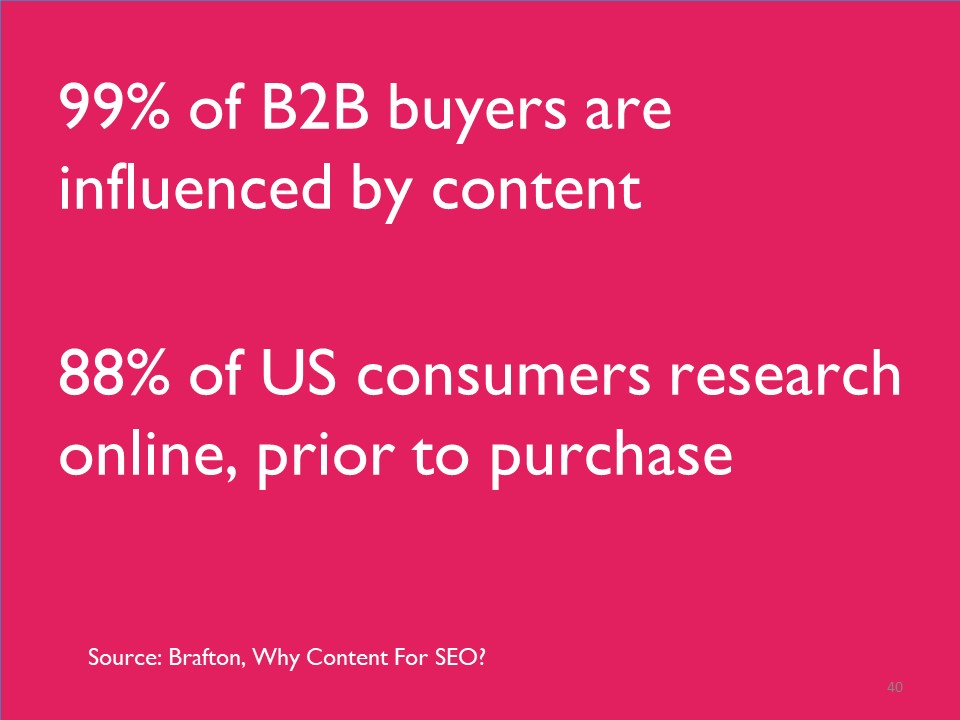
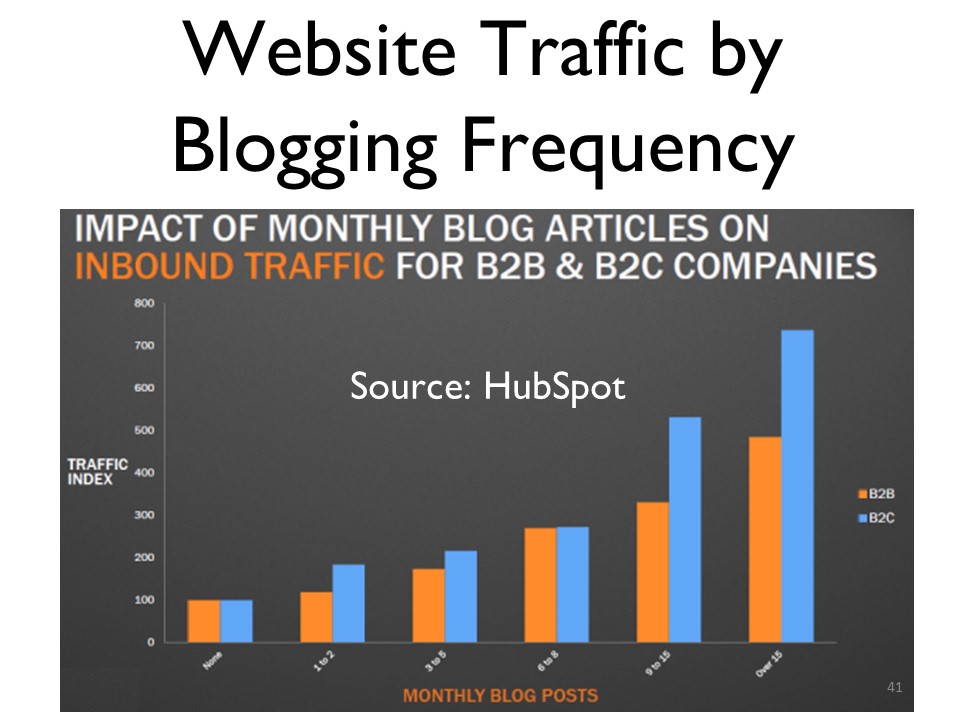
Website Traffic by Blogging Frequency
Impact of monthly blog articles on Inbound Traffic for B2B and B2C companies
Lead Generation by Blogging Frequency
Impact of monthly blog articles on Inbound Leads for B2B & B2C companies
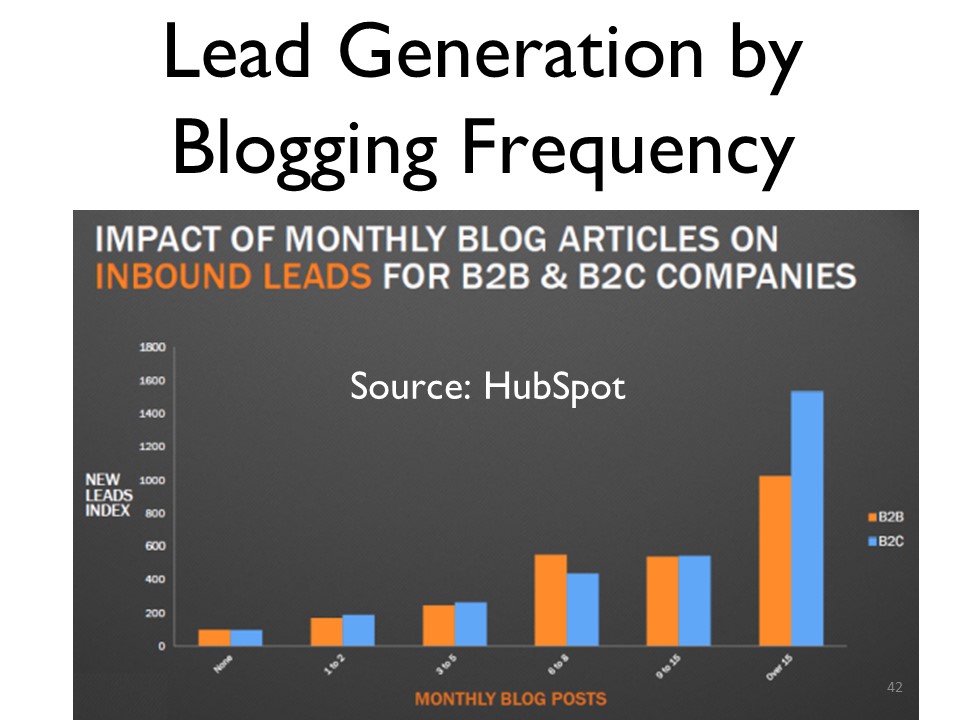
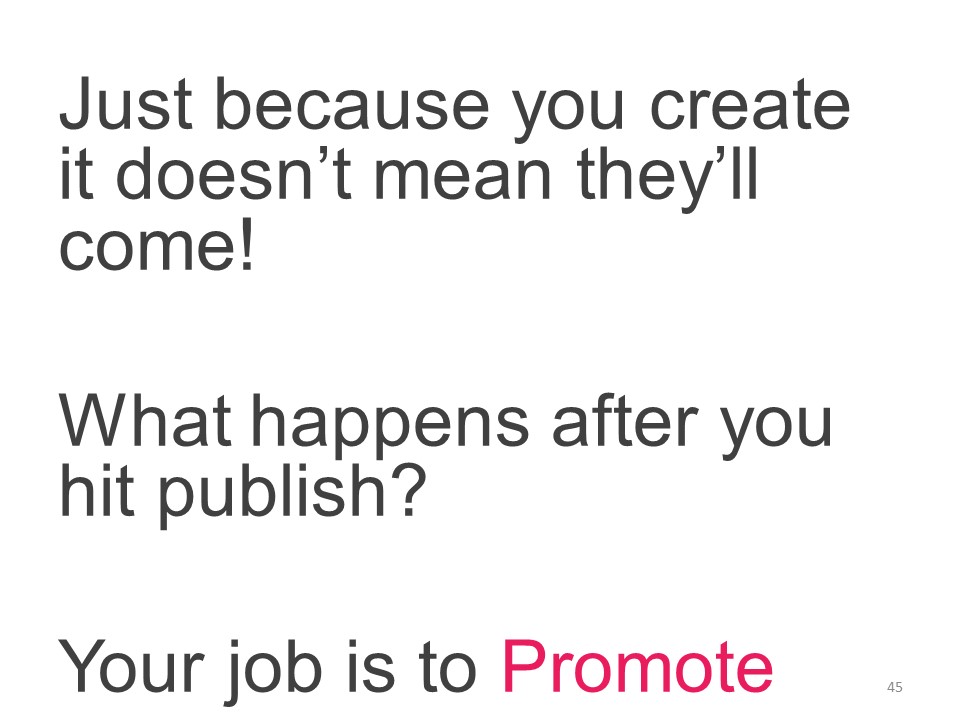
Just because you create it doesn’t mean they’ll come!
What happens after you hit publish?
Your job is to Promote
Influencer Outreach (O.I.L. Strategy)
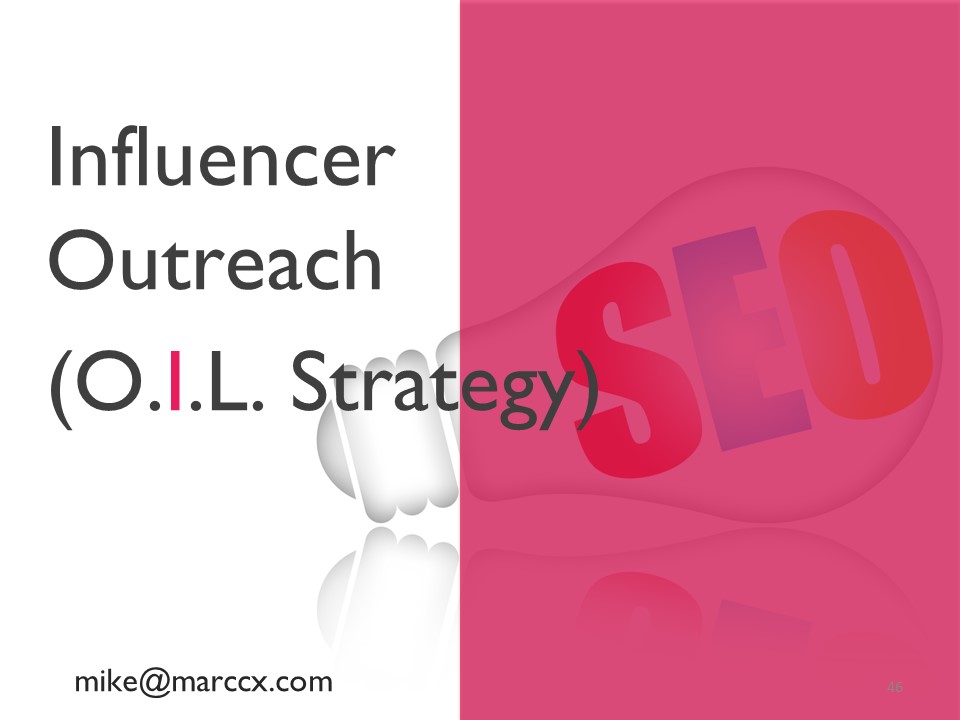
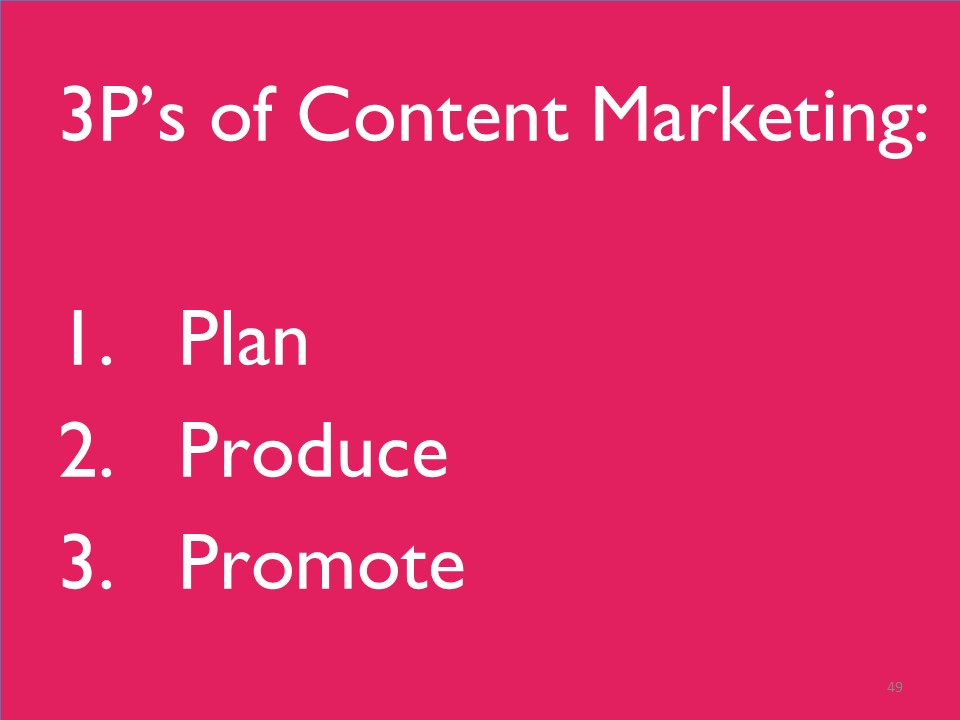
3Ps of Content Marketing
- Plan
- Produce
- Promote
Content Marketing – Plan
- Business Goal Setting: What’s your aim for developing a content marketing plan? Why do you want to produce content and create a content marketing plan? By reviewing your goals before you begin planning you’ll have an easier time determining what’s best for your strategy.
- Persona Development: To develop a successful plan, you need to clearly define your content’s target audience – also known as your “buyer persona”. By knowing your target audience, you can produce more relevant and valuable content that they’ll want to read and convert on.
- Keyword Research: While keyword selection and optimization should take a back seat to creating high-quality content that your audience needs and wants, systematic keyword research will help improve the chances your compelling content will reach those who will benefit most.
- Content Audit: Review your content marketing efforts by traffic and engagement signals to determine what content types and topics are most appealing to your readers.
- Brainstorm Content Ideas: There’s a thin line between writing for search and readers. Develop strategies and use tools to help brainstorm the best topics based on your customers and keywords.
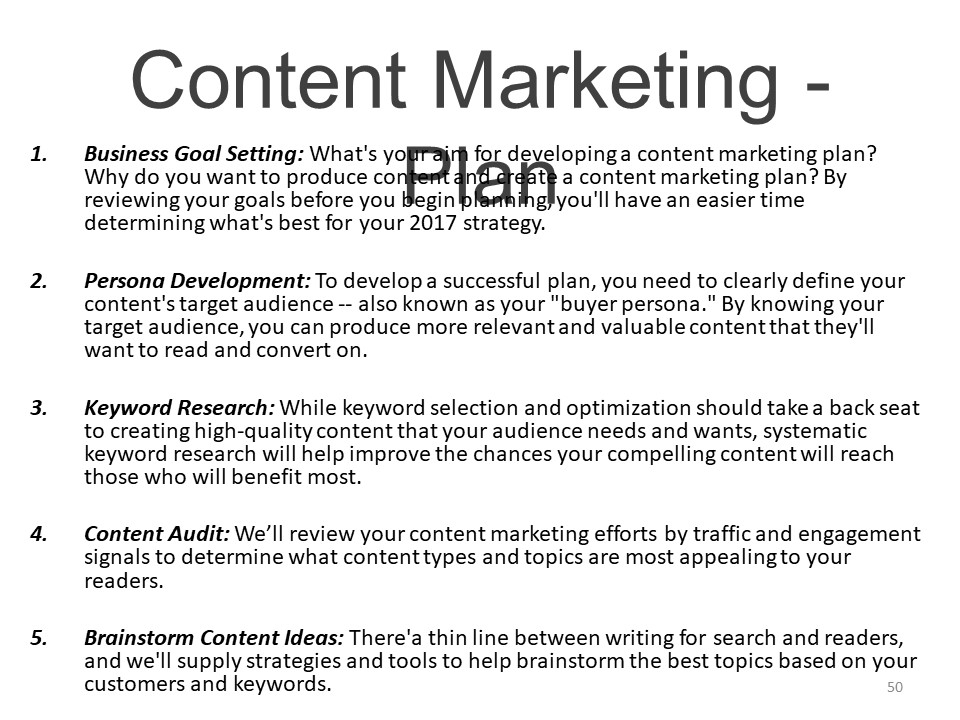
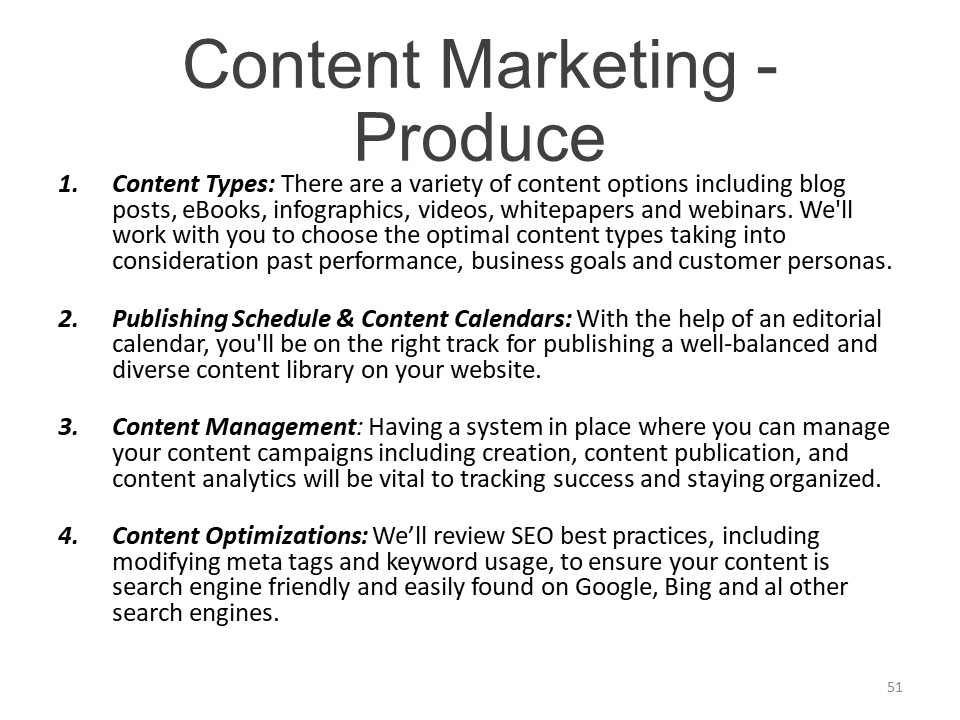
Content Marketing – Produce
- Content Types: There are a variety of content options including blog posts, eBooks, infographics, videos, whitepapers and webinars. Choose the optimal content types taking into consideration past performance, business goals and customer personas.
- Publishing Schedule & Content Calendars: With the help of an editorial calendar, you’ll be on the right track for publishing a well-balanced and diverse content library on your website.
- Content Management: Having a system in place where you can manage your content campaigns including creation, content publication, and content analytics will be vital to tracking success and staying organized.
- Content Optimizations: We’ll review SEO best practices, including modifying meta tags and keyword usage, to ensure your content is search engine friendly and easily found on Google, Bing and all other search engines.
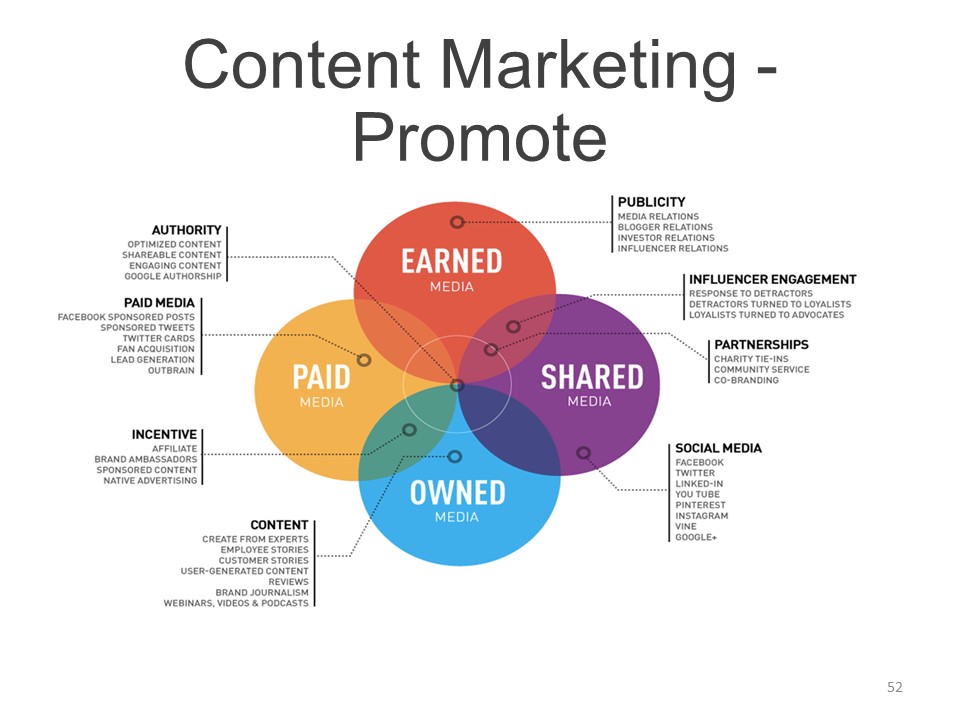
Content Marketing – Promote
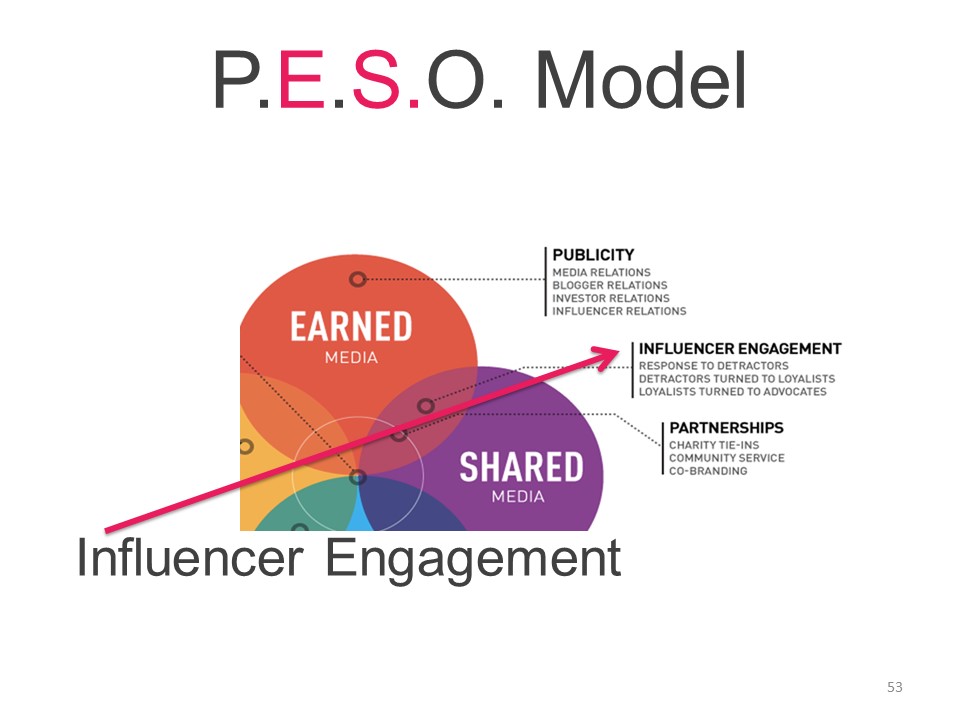
P.E.S.O. Model
Influencer Engagement
Why Influencers?
- On average, businesses generate $6.50 for every $1 invested in Influencer Marketing (Convince & Convert 2015)
- Every share, tweet, post, etc. is a Link Building opportunity
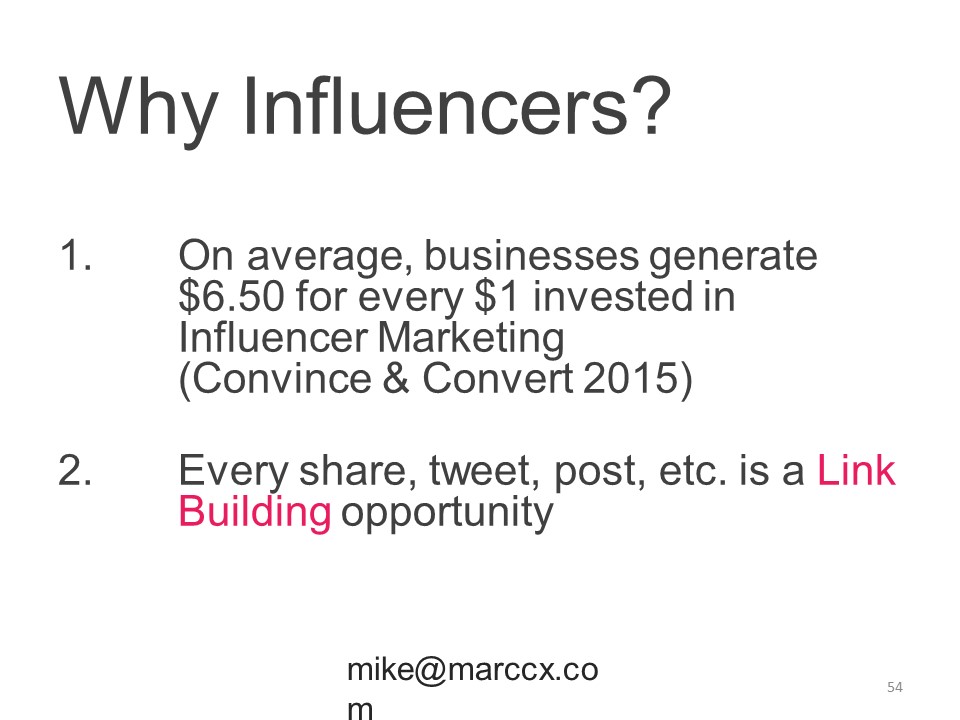
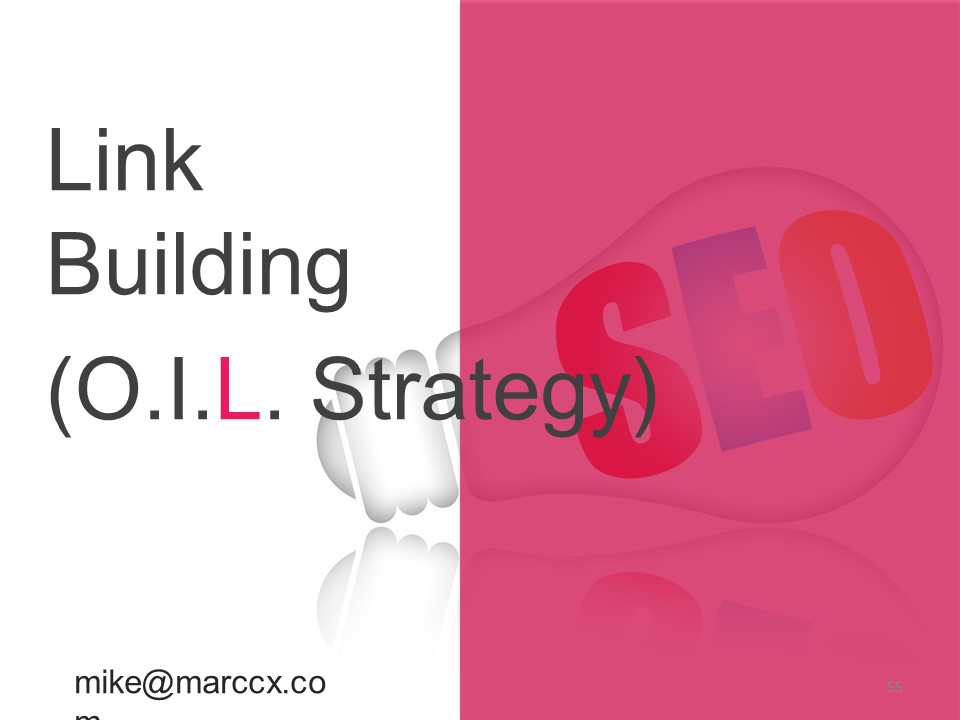
Link Building (O.I.L. Strategy)
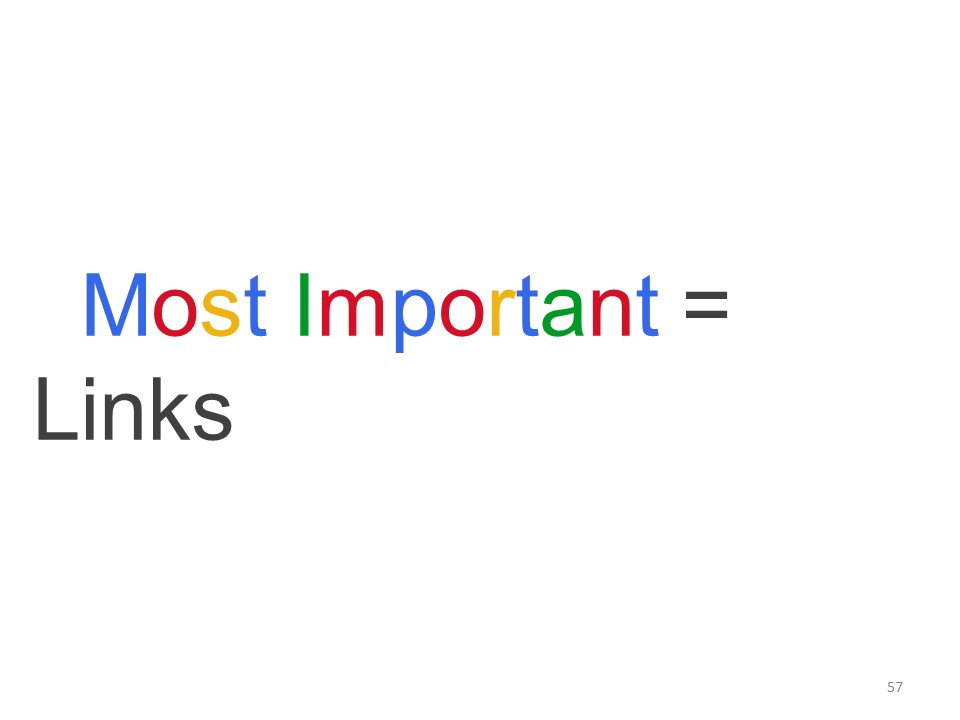
Most Important = Links
Links continue to show one of the strongest associations with higher rankings out of all ranking factors (Moz 2015 Search Ranking Report)
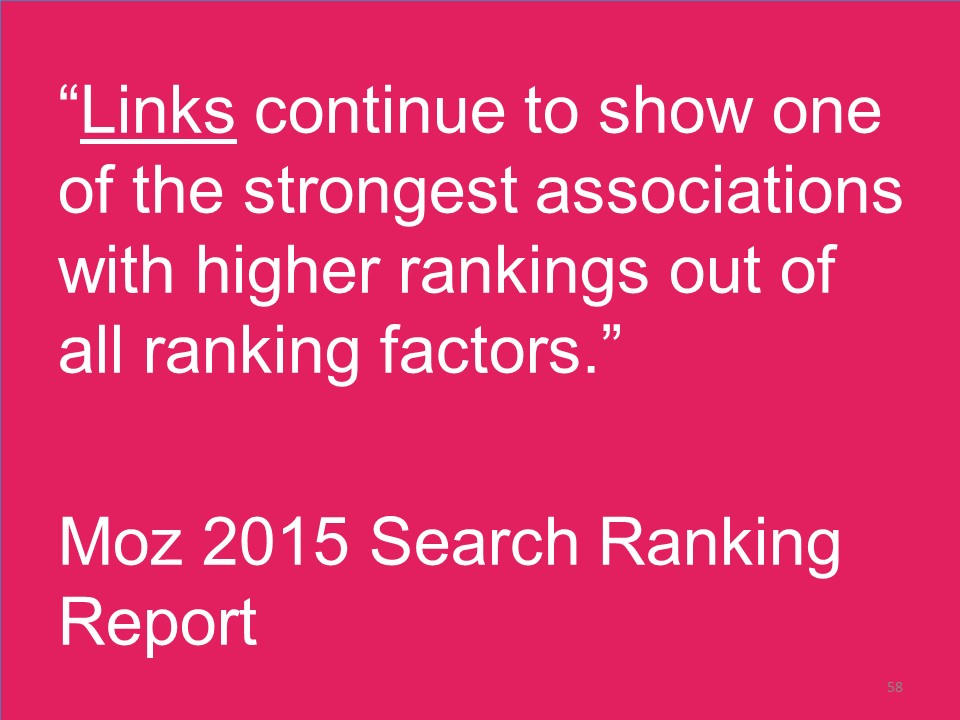
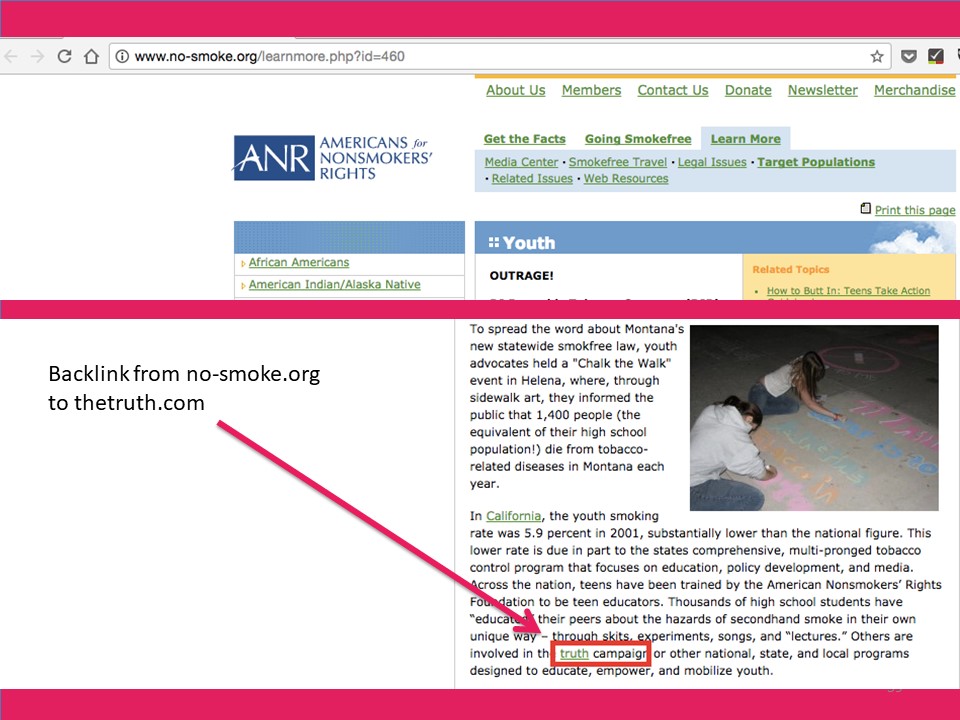
Example: Backlink from no-smoke.org to thetruth.com
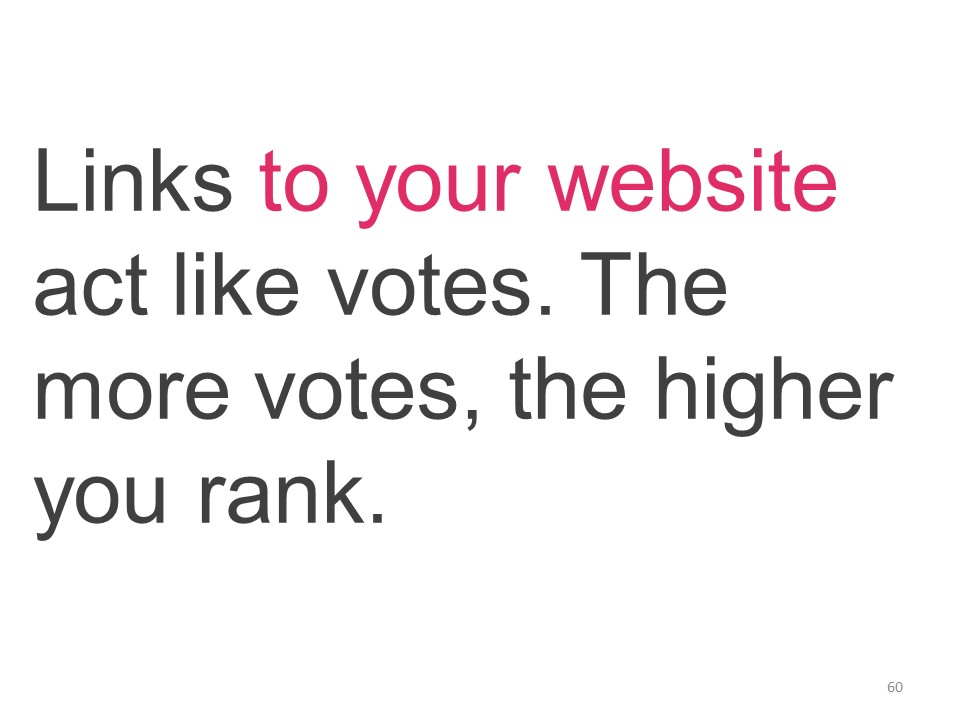
Links to your website act like votes. The more votes, the higher you rank.
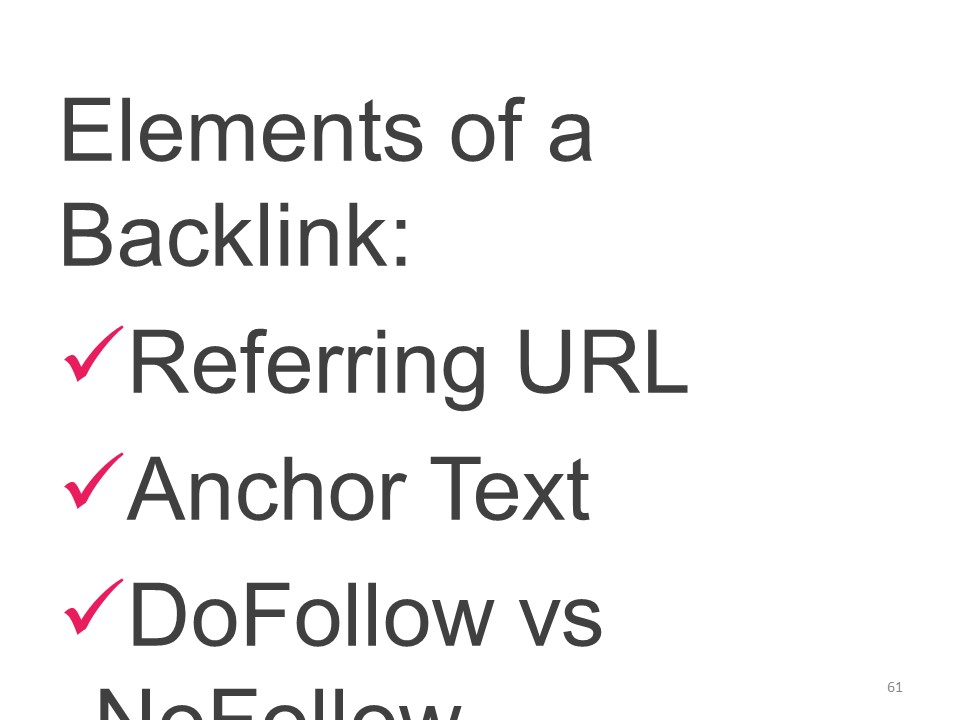
Elements of a Backlink
- Referring URL
- Anchor Text
- DoFollow vs NoFollow
Referring URL
The higher the authority (e.g. Moz Domain Authority or Majestic Trust Flow), the more votes you receive
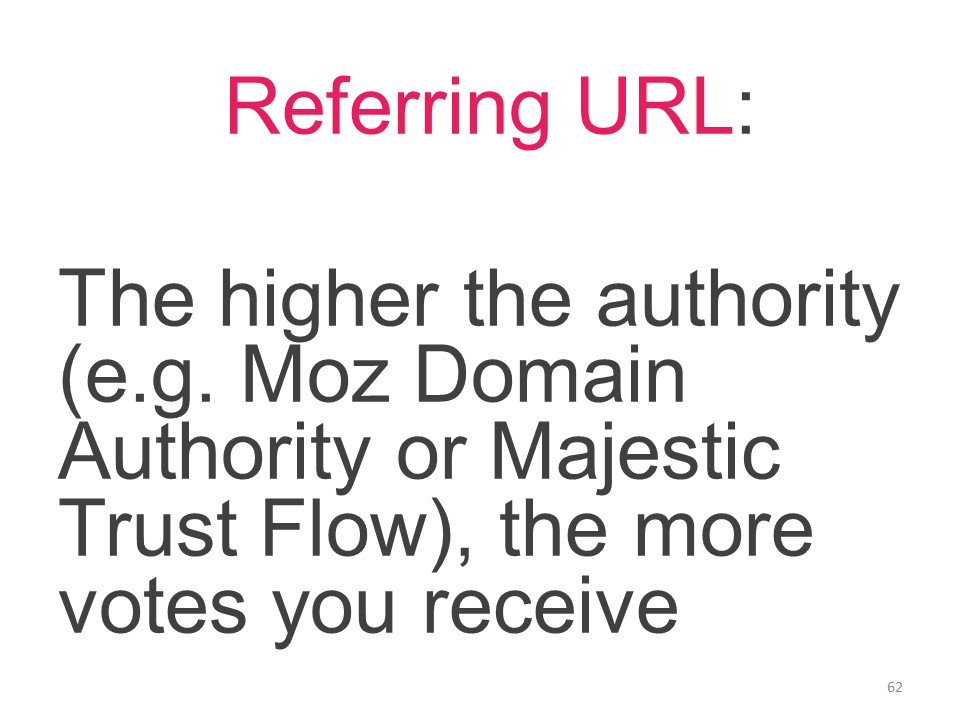
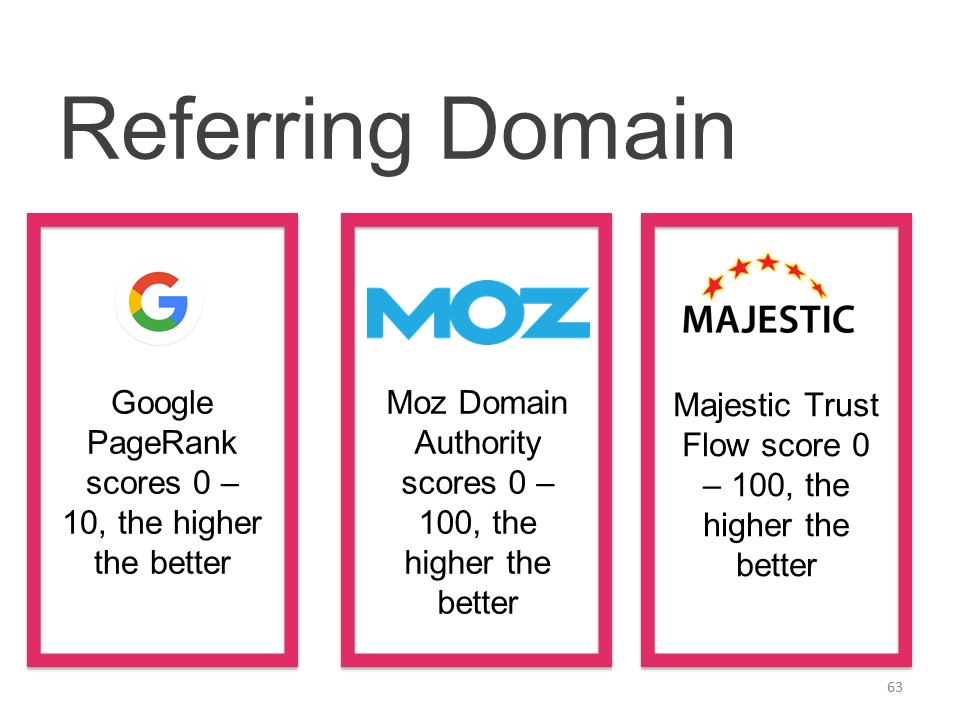
- Google PageRank scores 0-10, the higher the better
- Moz Domain Authority scores 0-100, the higher the better
- Majestic Trust Flow score 0-100, the higher the better
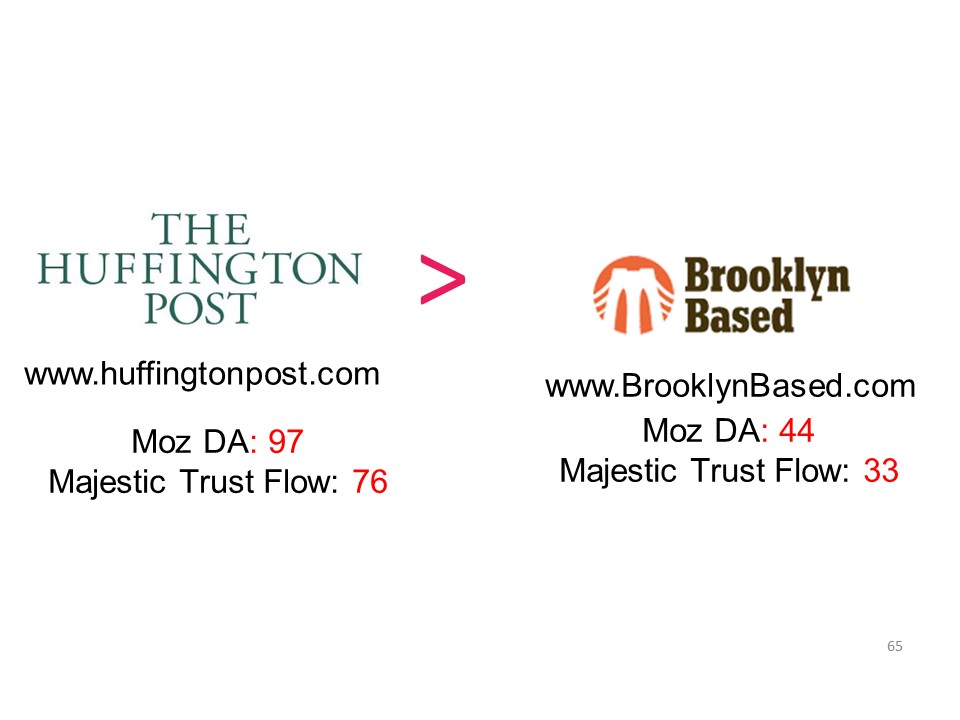
- www.huffingtonpost.com
- Moz DA: 97
- Majestic Trust Flow: 76
- www.BrooklynBased.com
- Moz DA: 44
- Majestic Trust Flow: 33
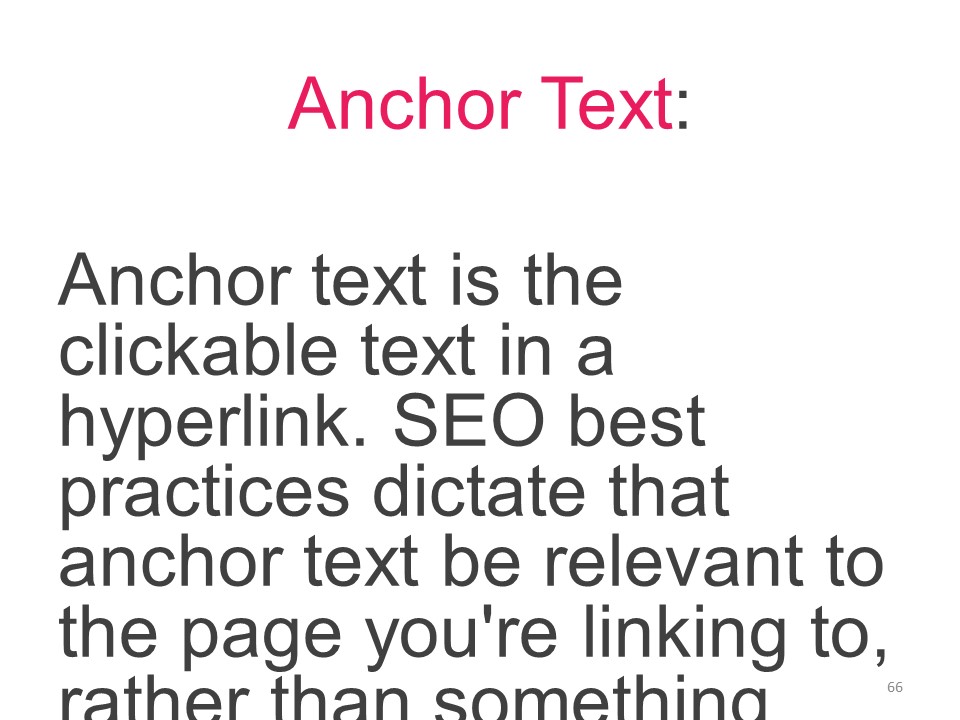
Anchor Text
Anchor text is the clickable text in a hyperlink. SEO best practices dictate that anchor text be relevant to the page you’re linking to, rather than something generic.
The anchor text is “truth”
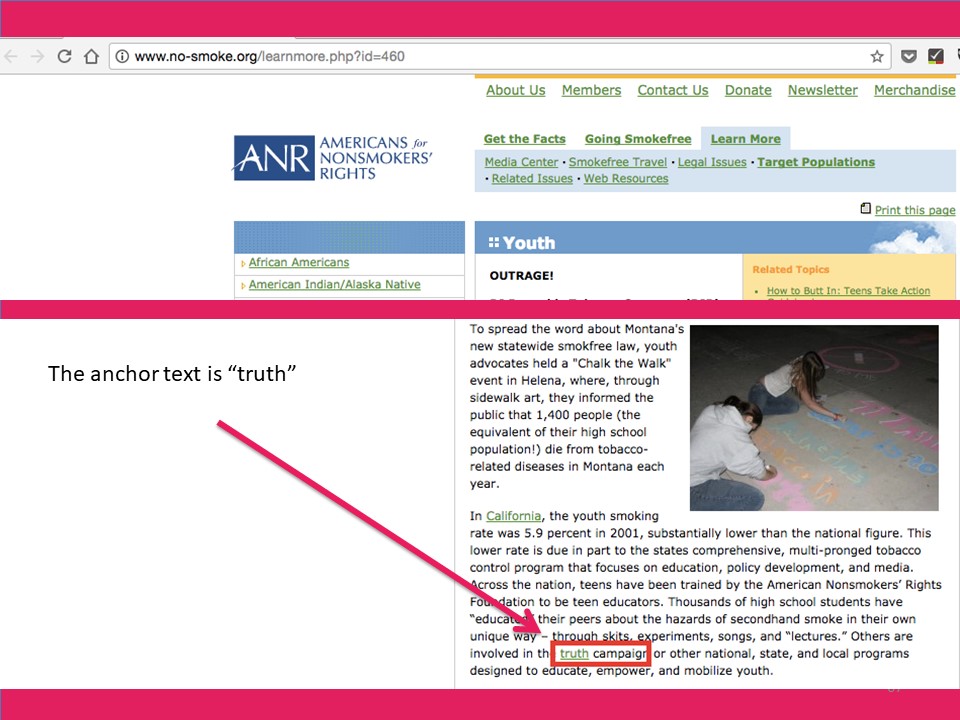
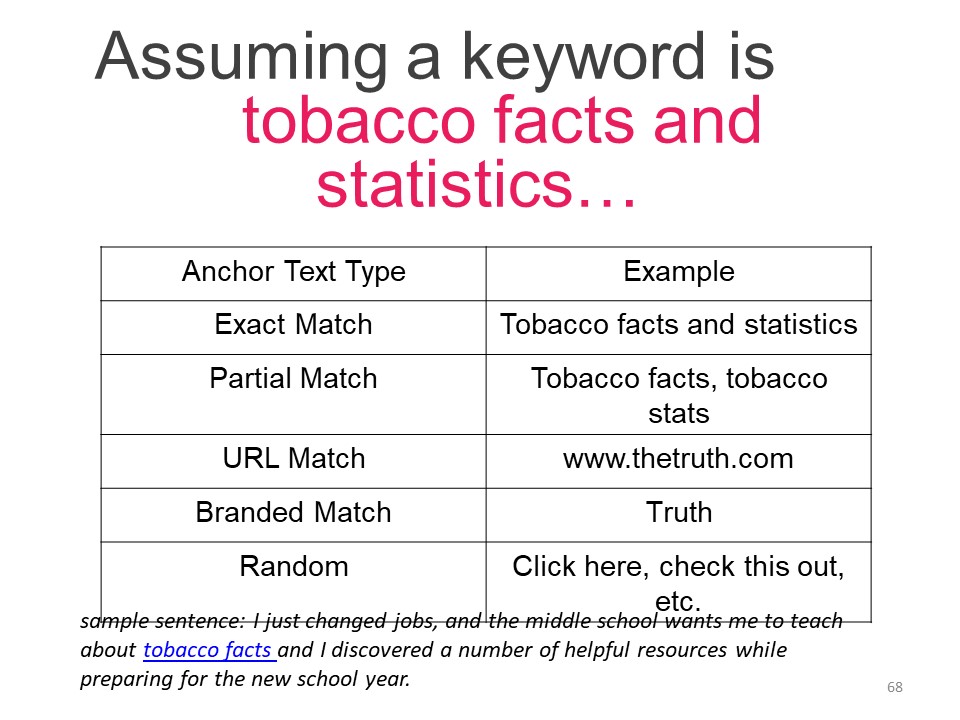
Assuming a keyword is “tobacco facts and statistics”
- Anchor Text Type | Example
- Exact Match | Tobacco facts and statistics
- Partial Match | Tobacco facts, tobacco stats
- URL Match | www.thetruth.com
- Branded Match | Truth
- Random | Click here, check this out, etc.
DoFollow vs NoFollow Tags
If a blog or website uses the NoFollow tag, the search engines do not acknowledge the link
rel=”nofollow”
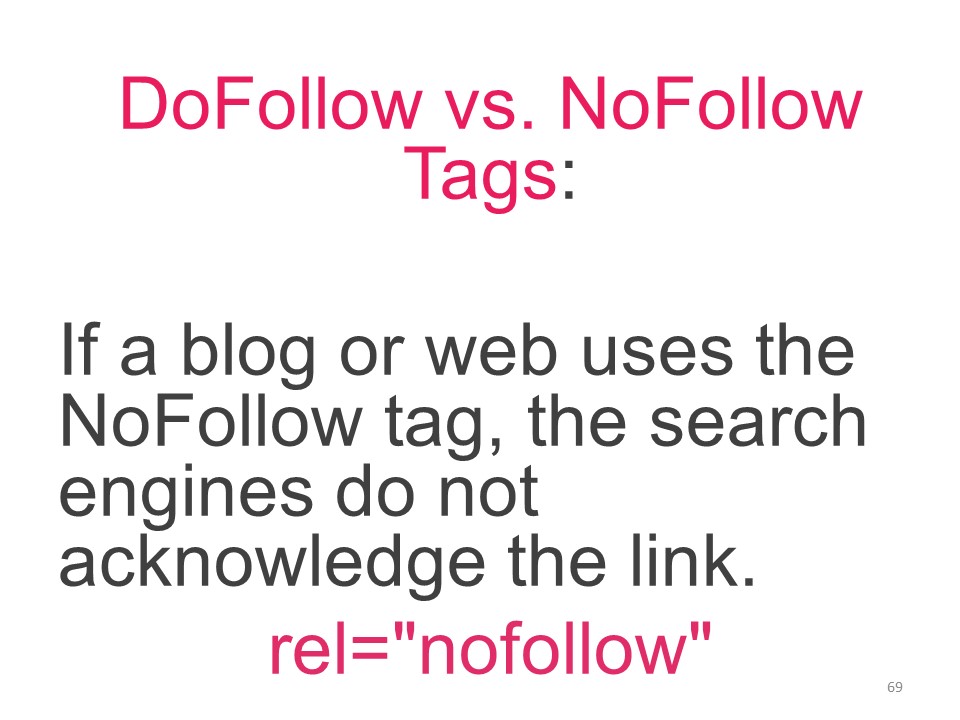
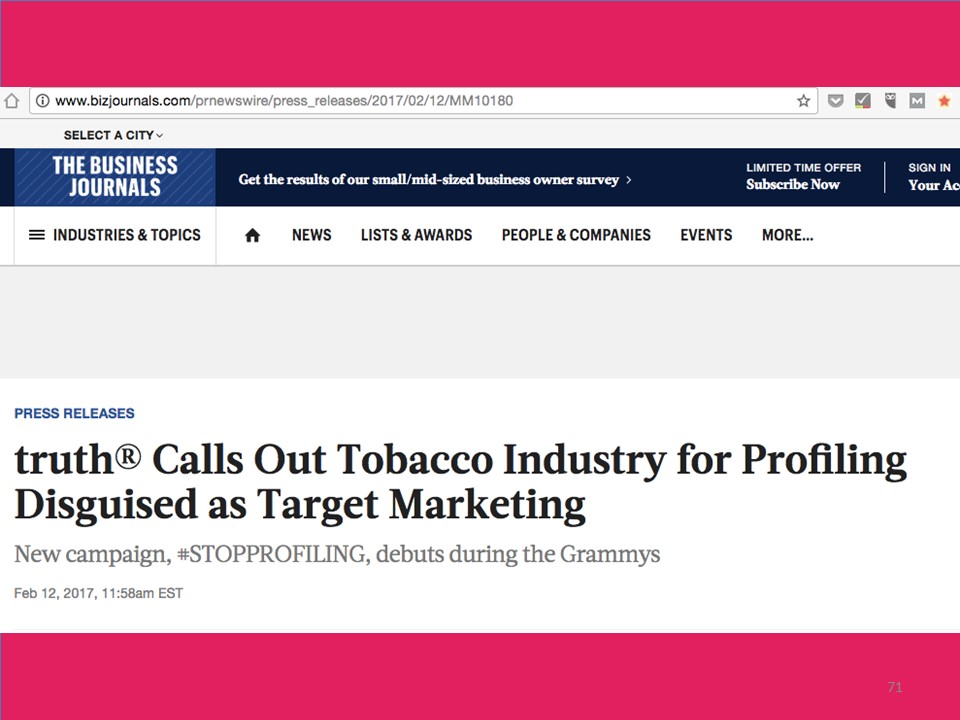
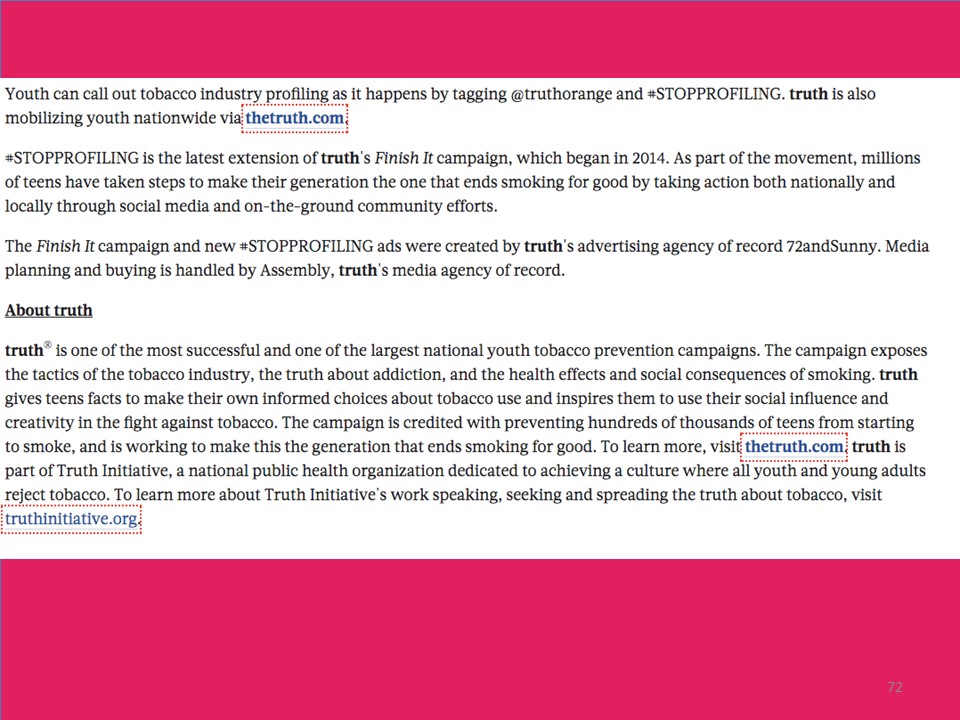
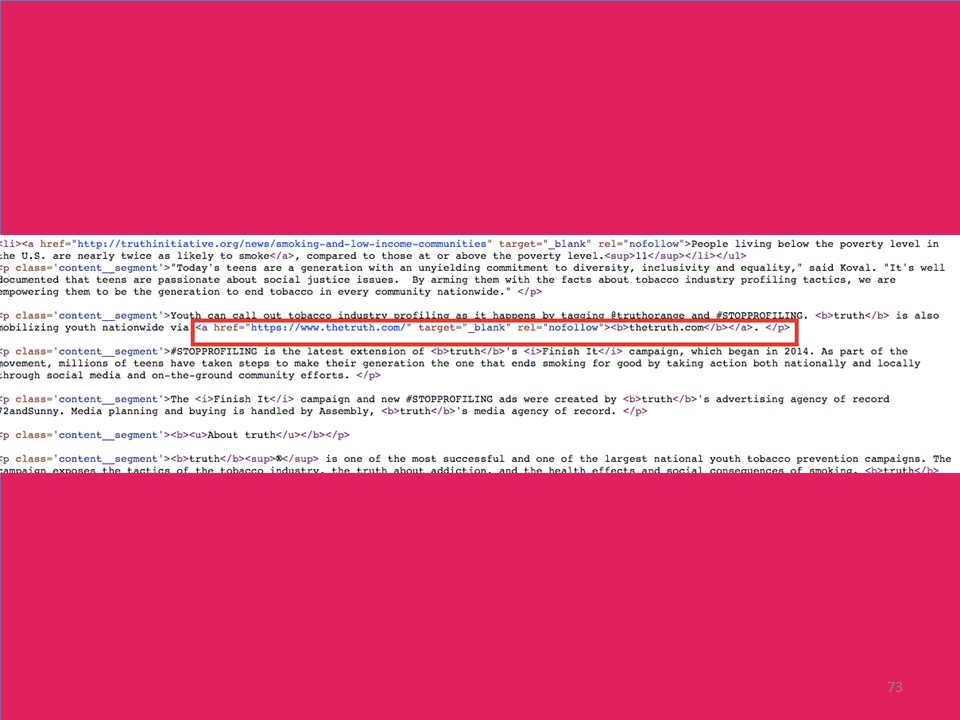
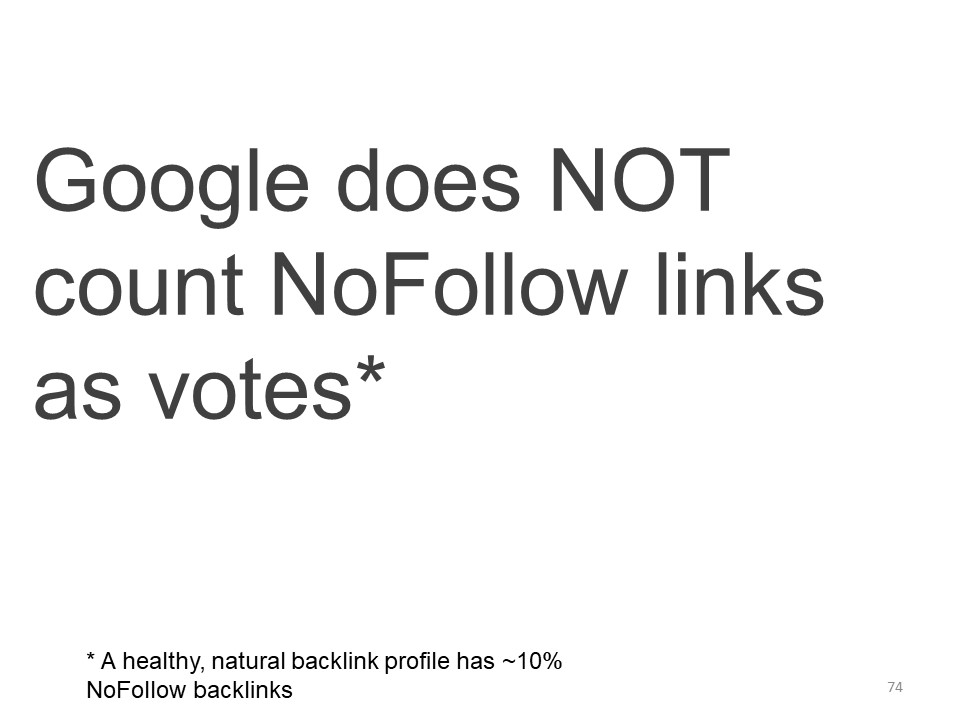
Google does NOT count NoFollow links as votes
*A healthy, natural backlink profile has ~10% NoFollow backlinks
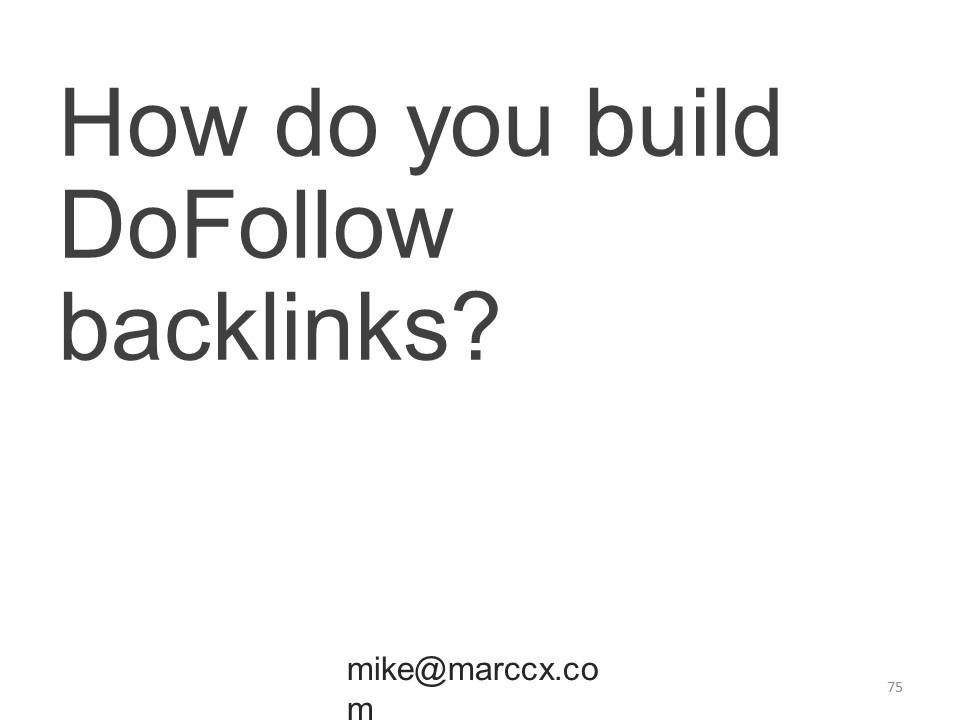
How do you build DoFollow backlinks?
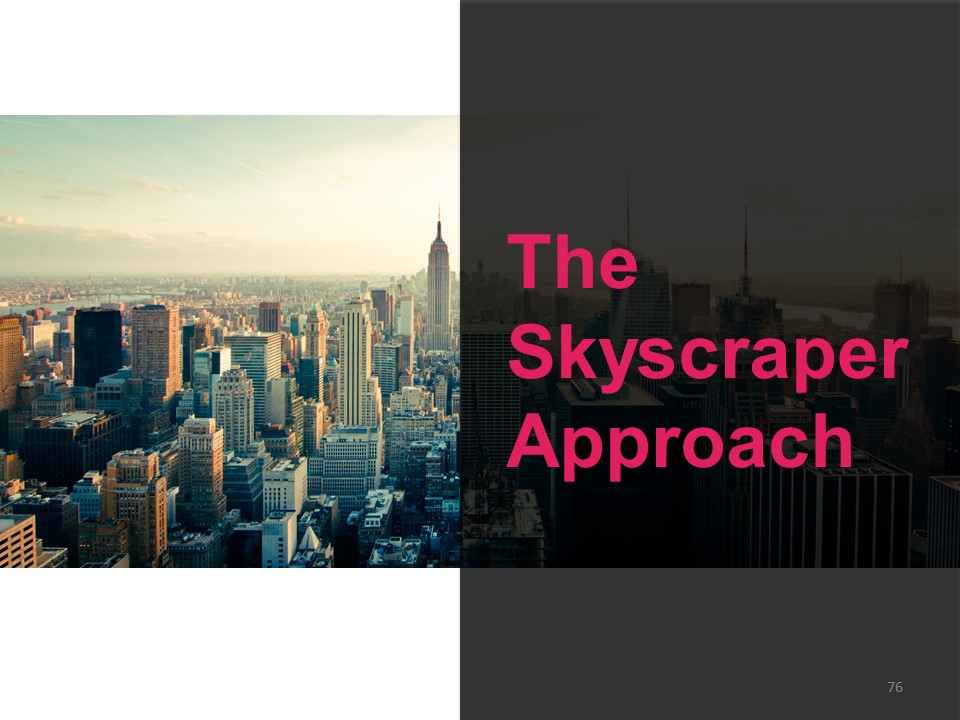
The Skyscraper Approach
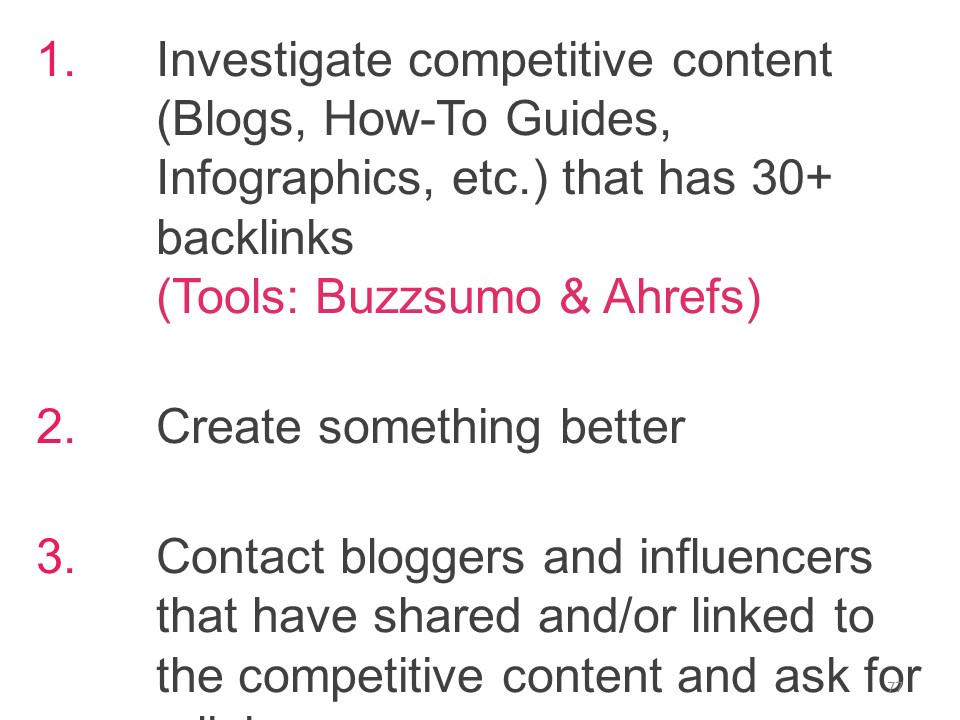
- Investigate competitive content (blogs, how-to guids, infographics, etc.) that have 30+ backlinks (Tools: Buzzsumo & Ahrefs)
- Create something better
- Contact bloggers and influencers that shared and/or linked to the competitive content and ask for a link (Tools: Buzzstream)
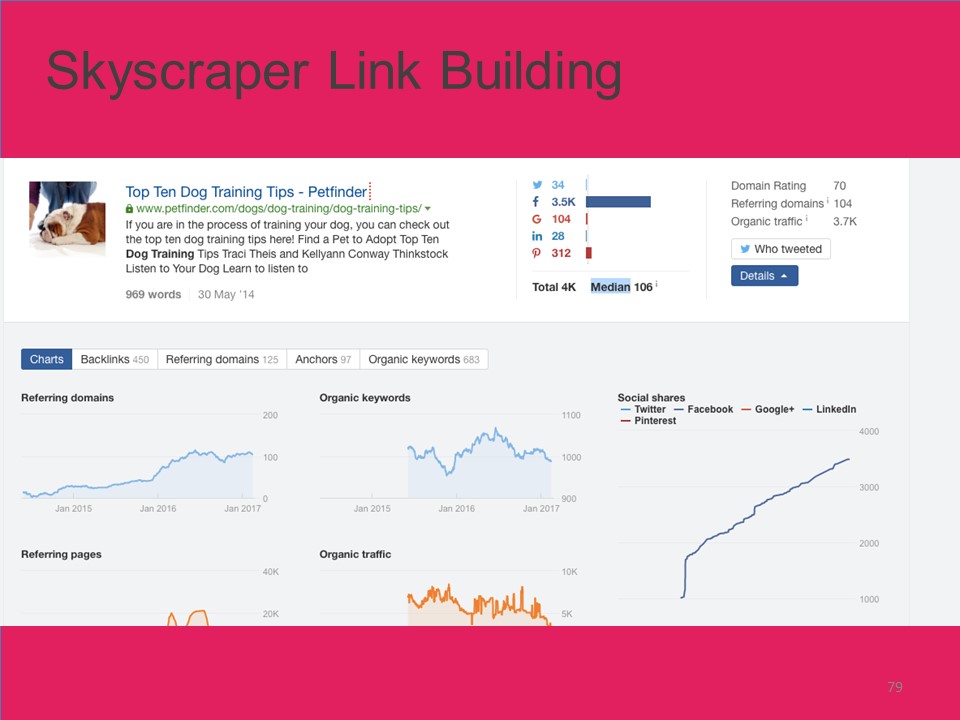
Skyscraper Link Building – example “dog training”
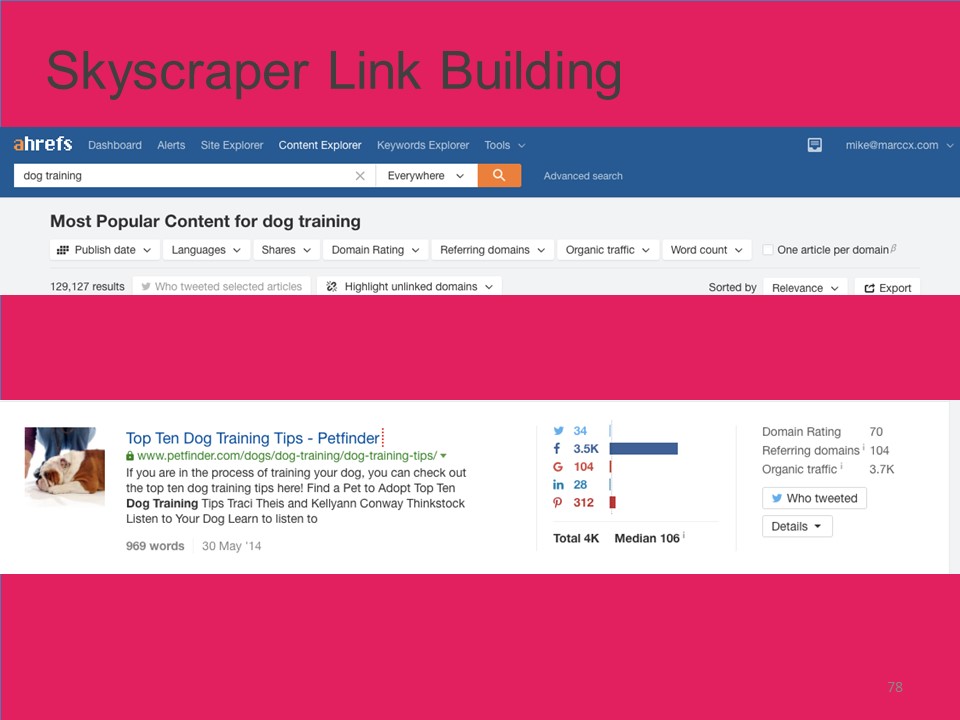
Skyscraper Link Building – example “dog training”
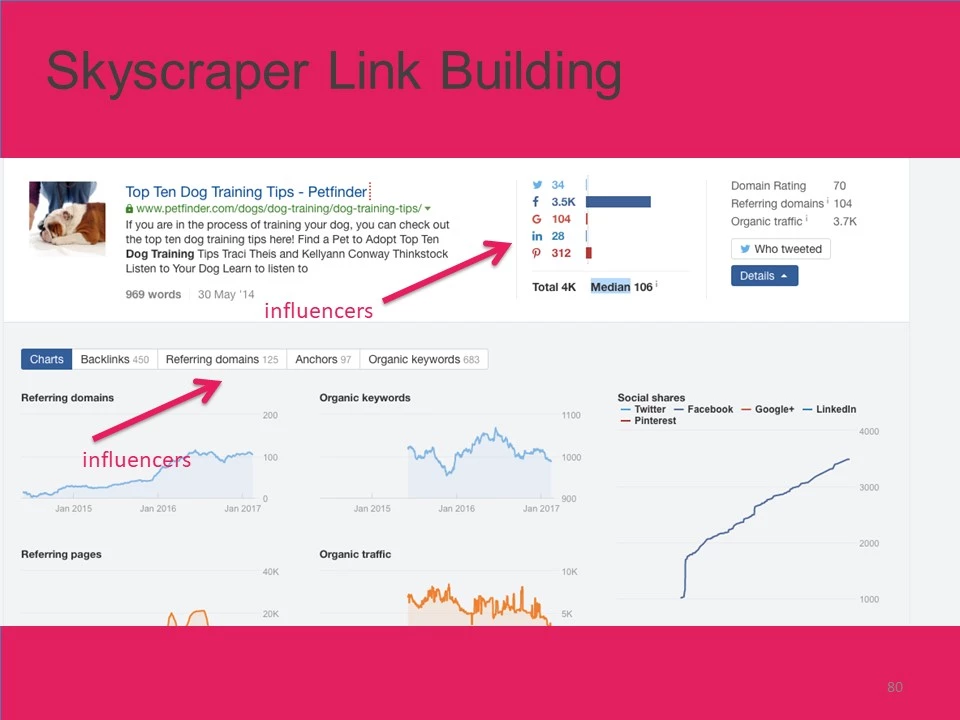
Skyscraper Link Building – example “dog training”
Identify Influencers
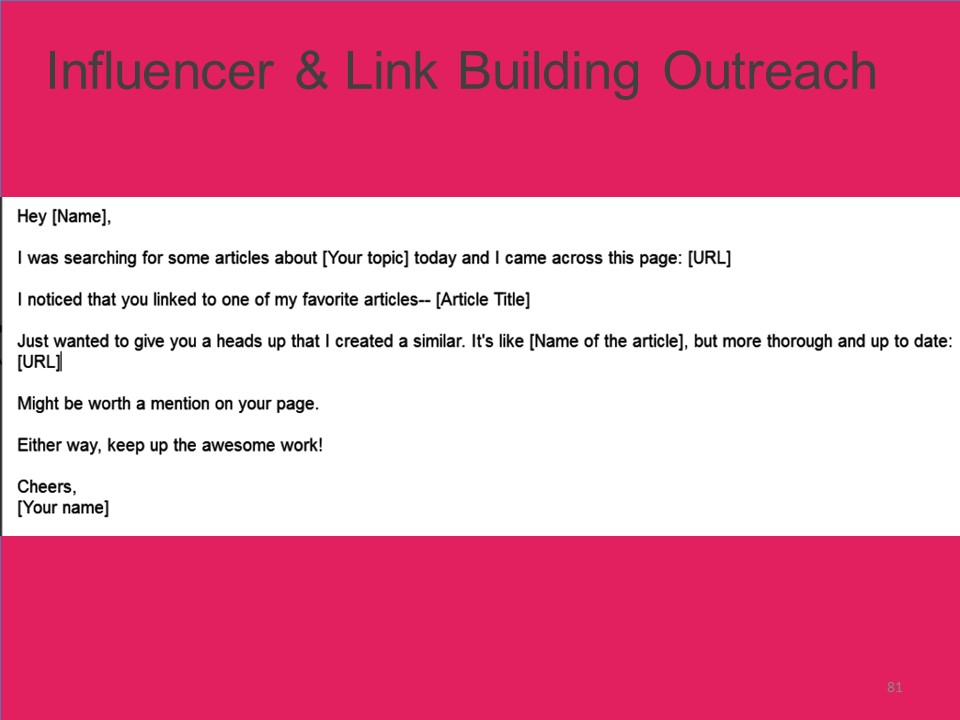
Influencer & Link Building Outreach
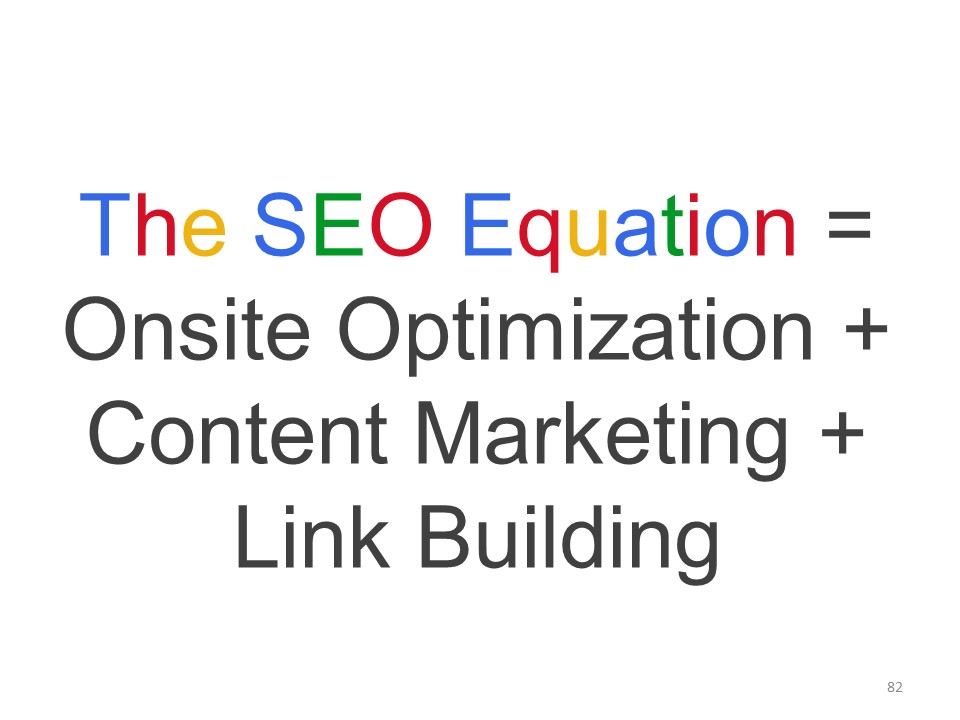
The SEO Equation = Onsite Optimization + Content Marketing + Link Building
